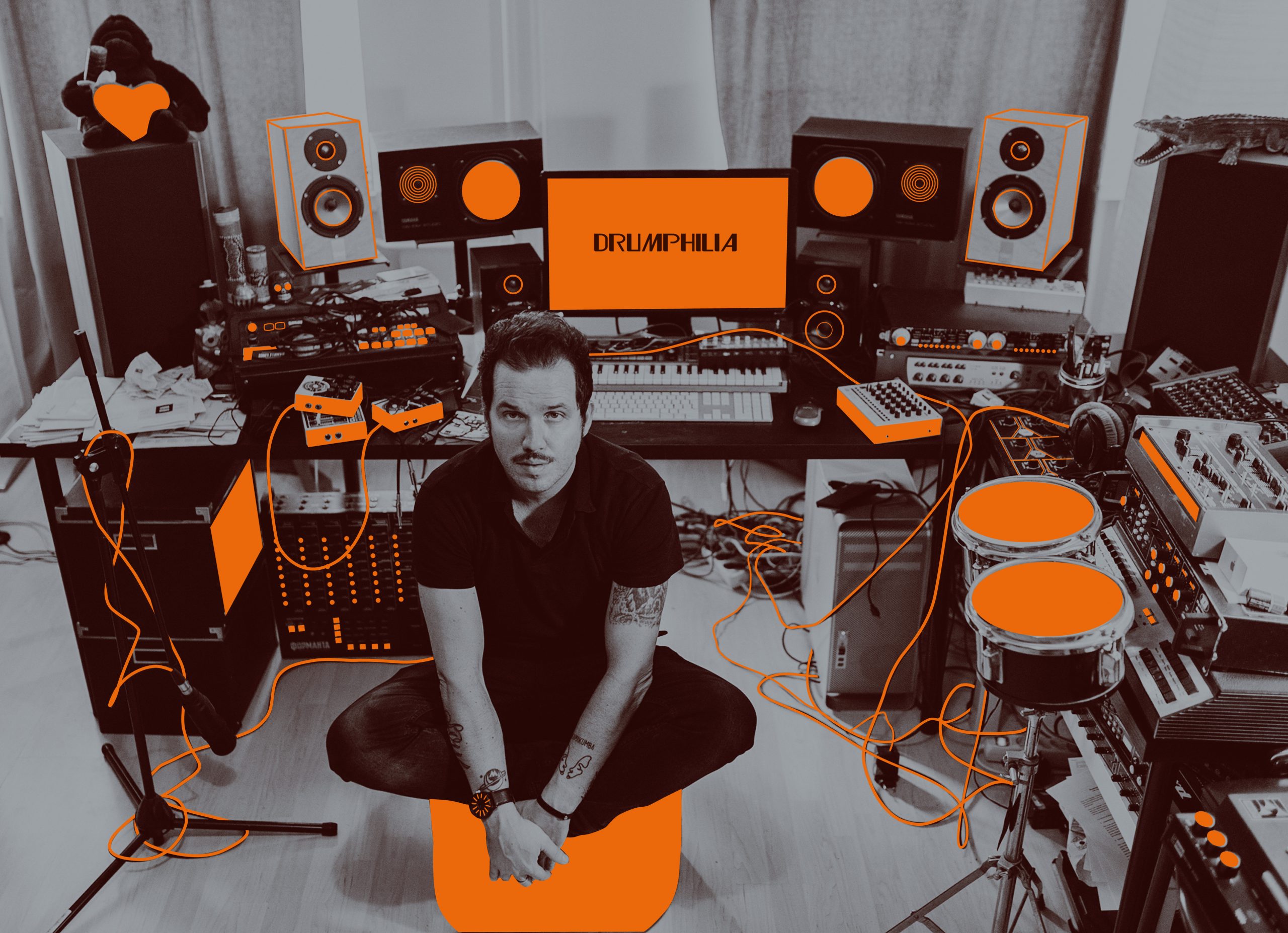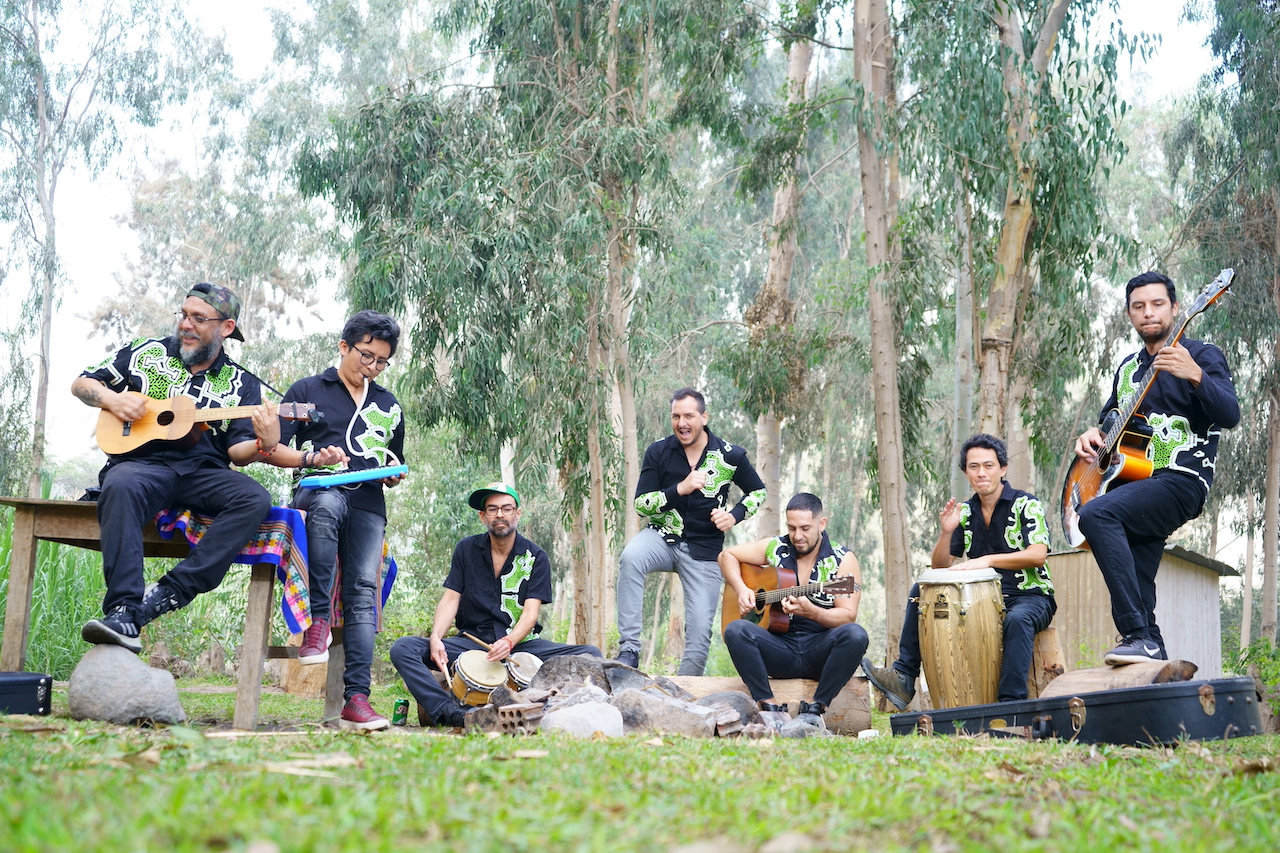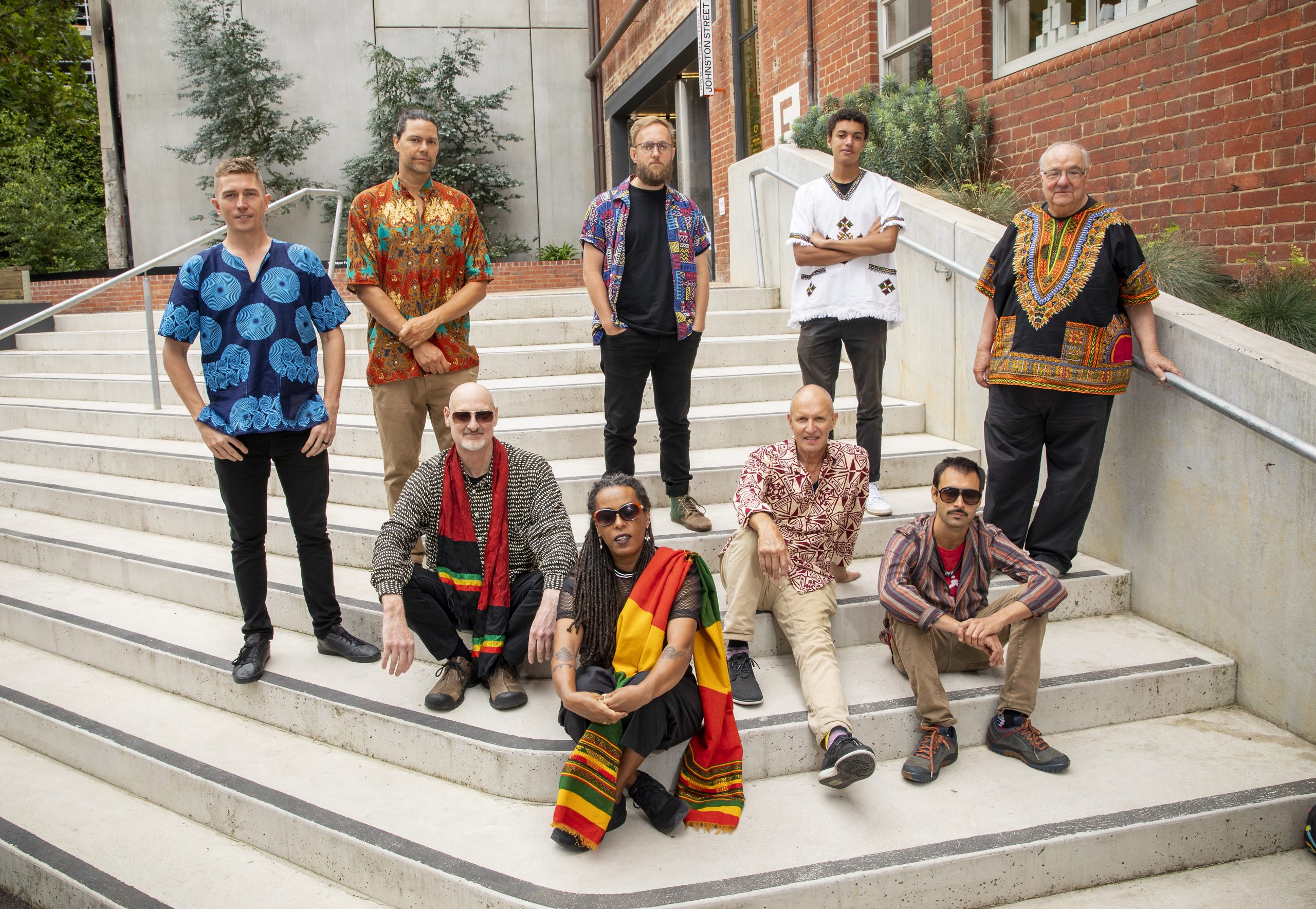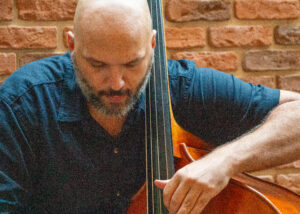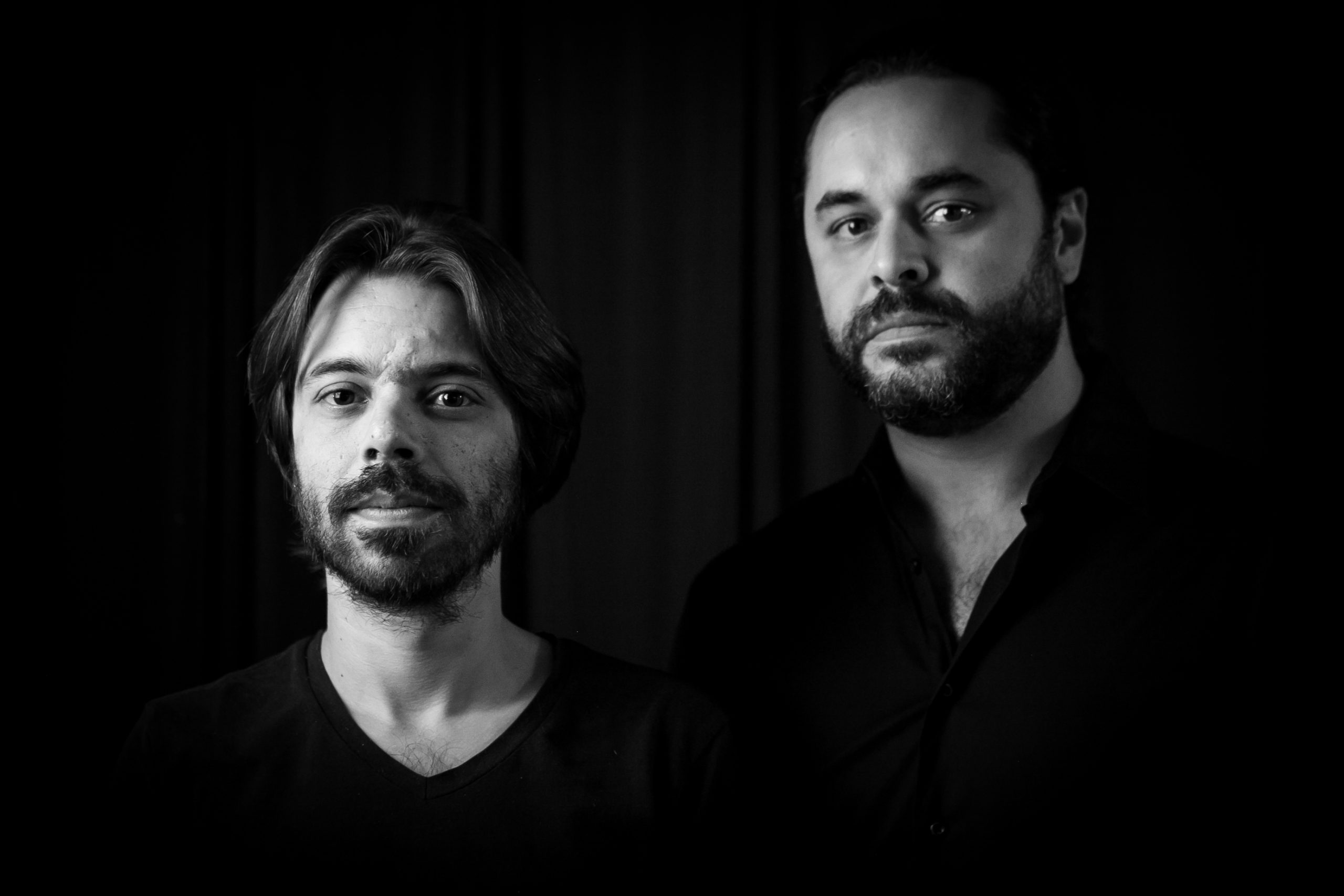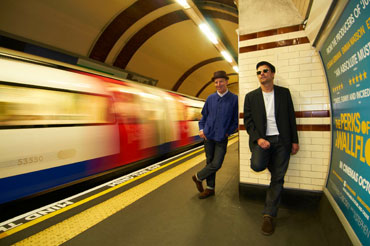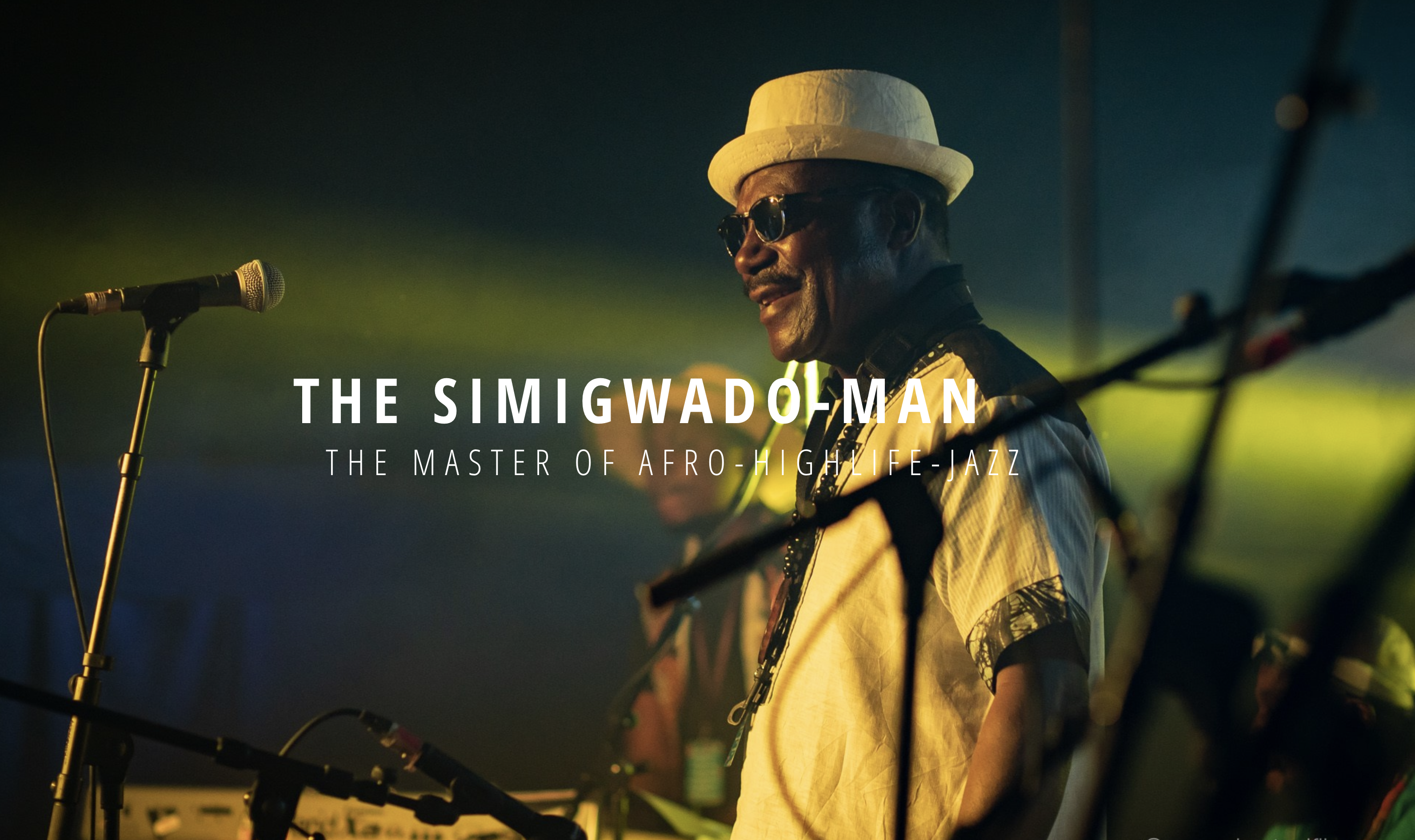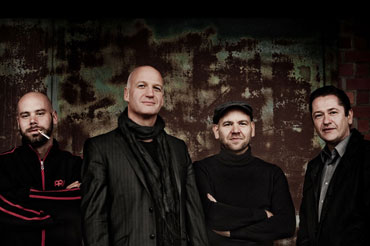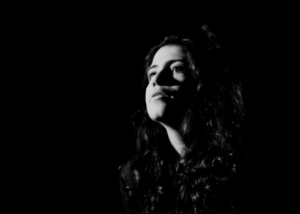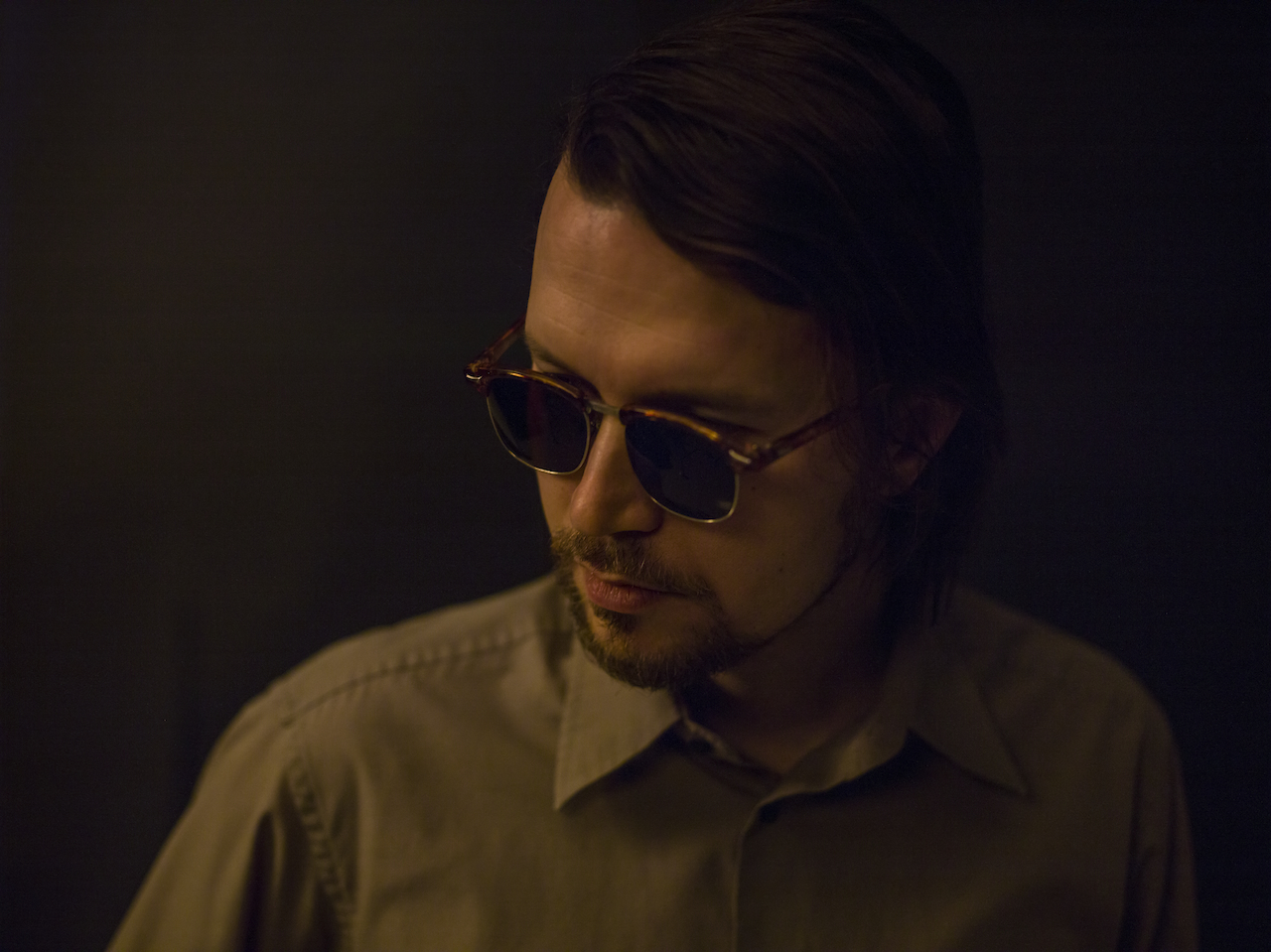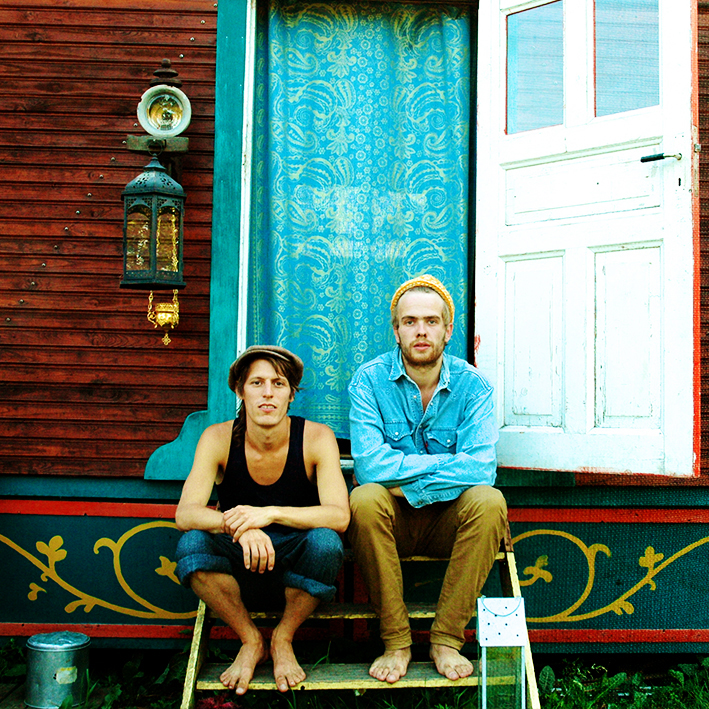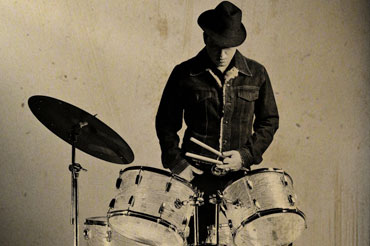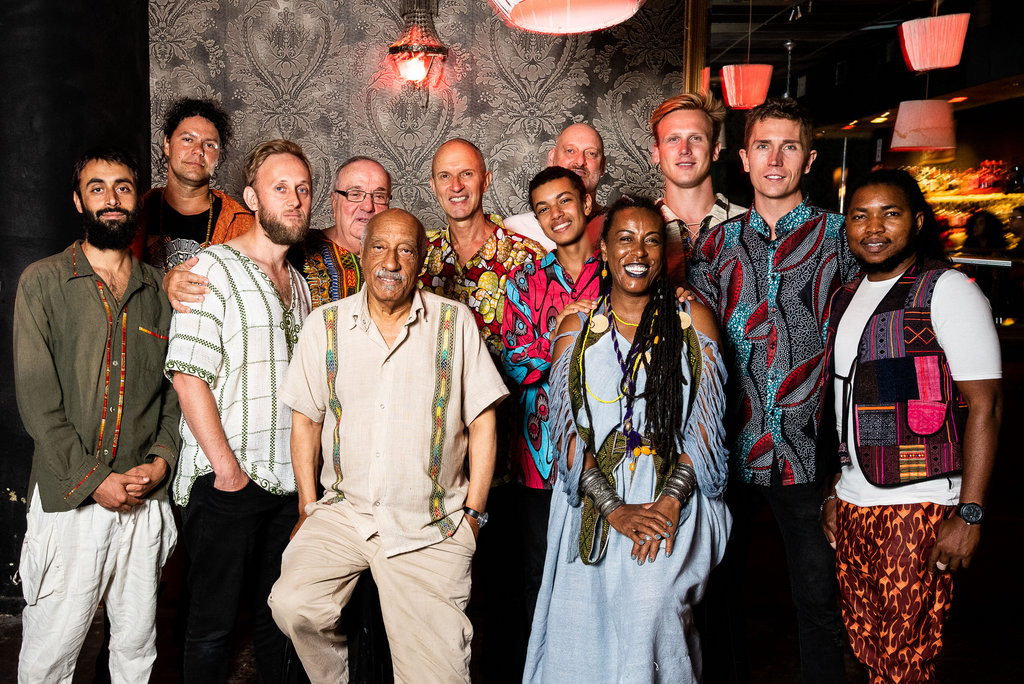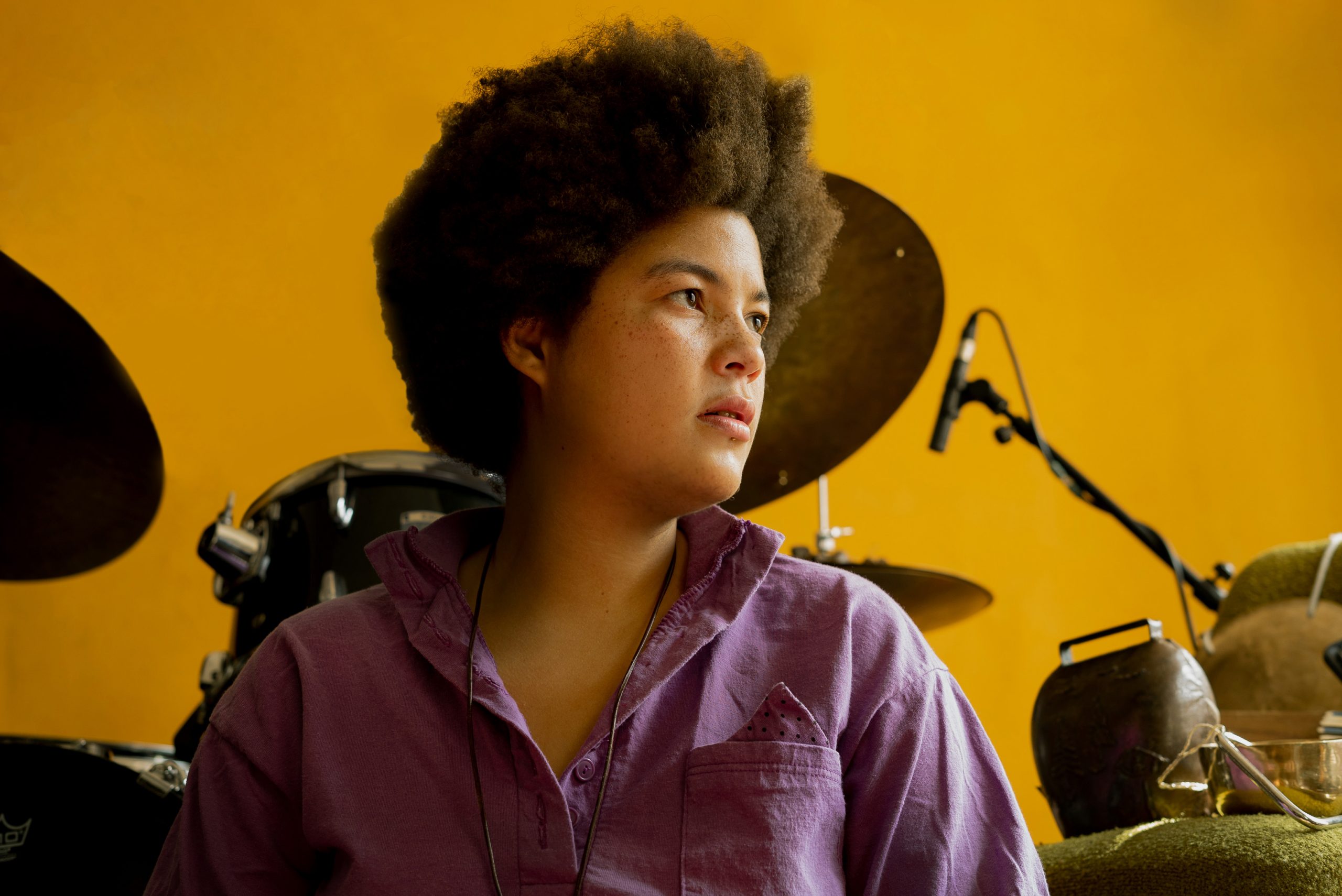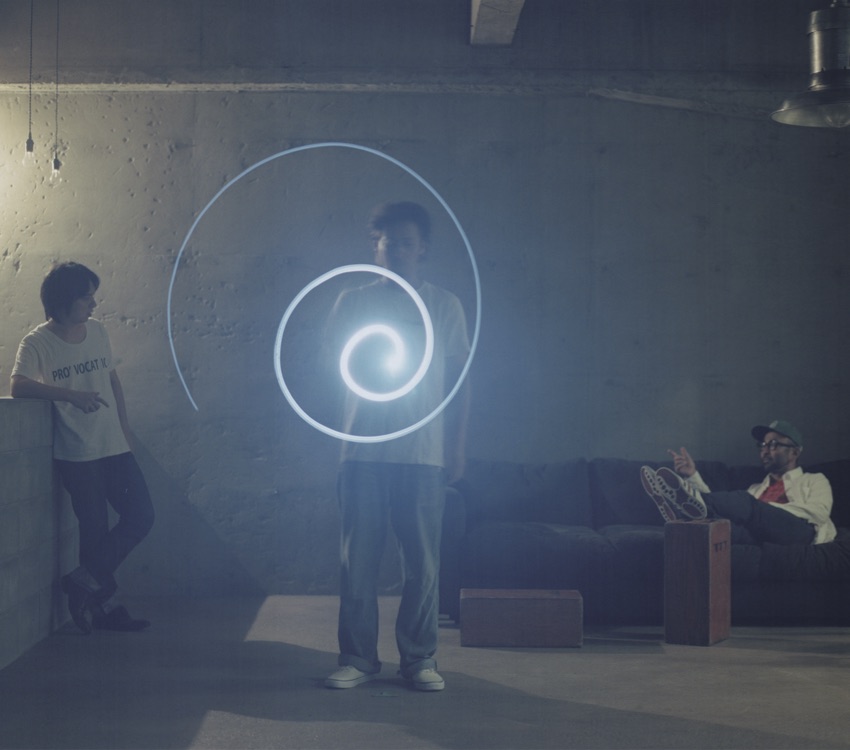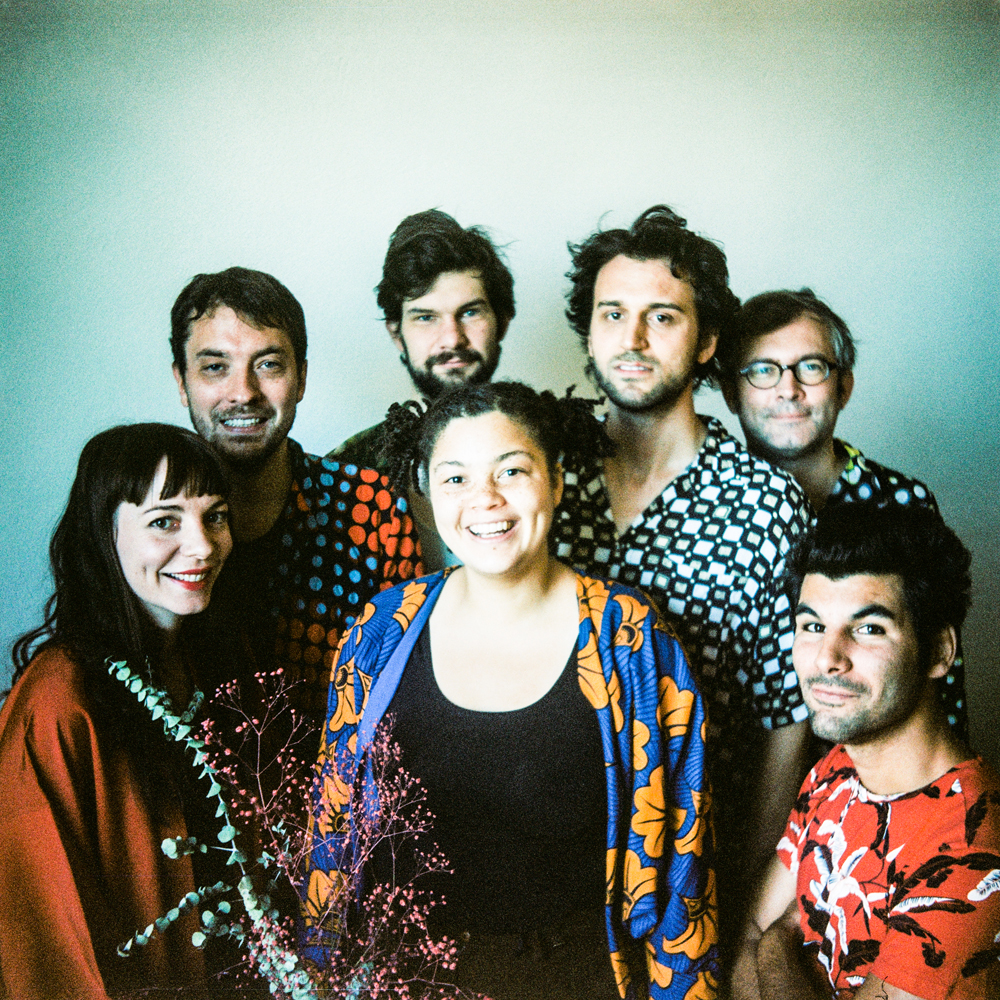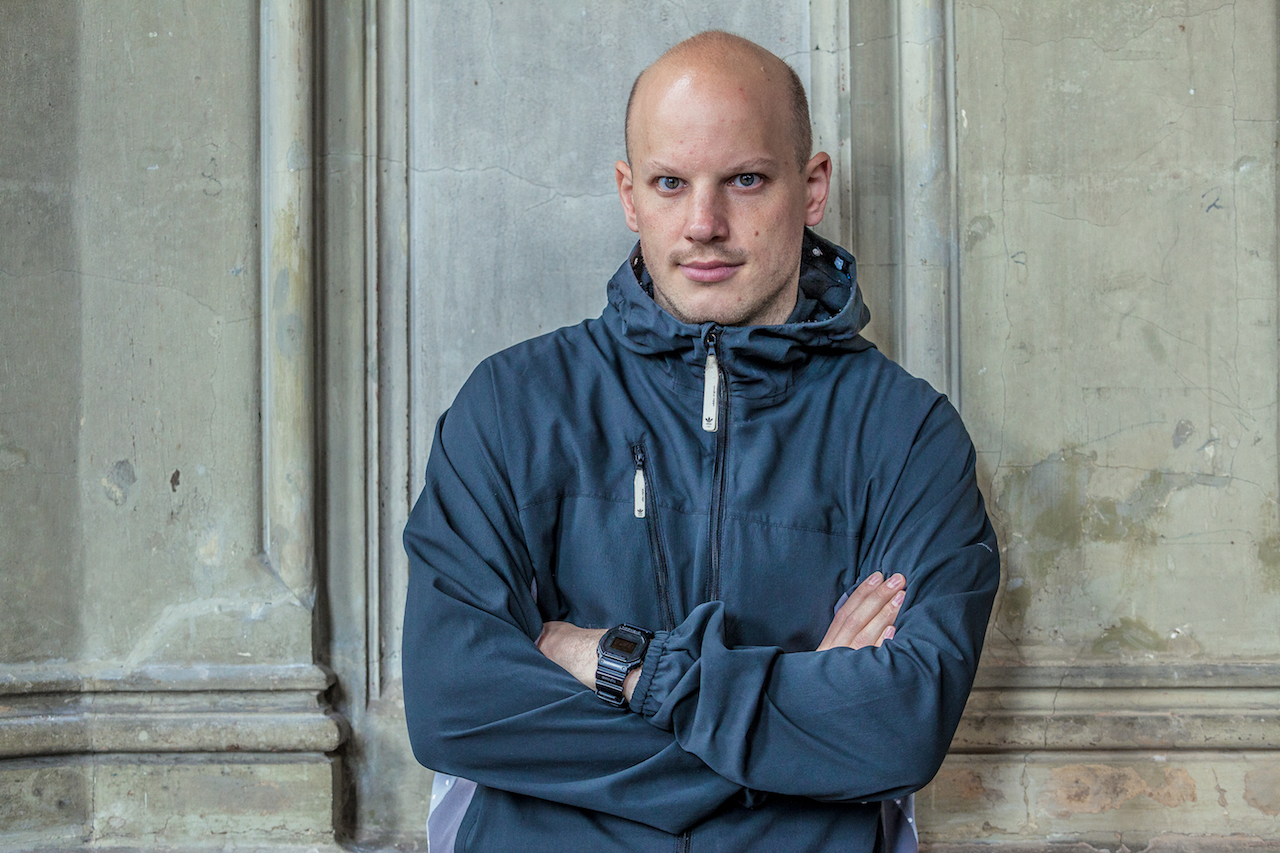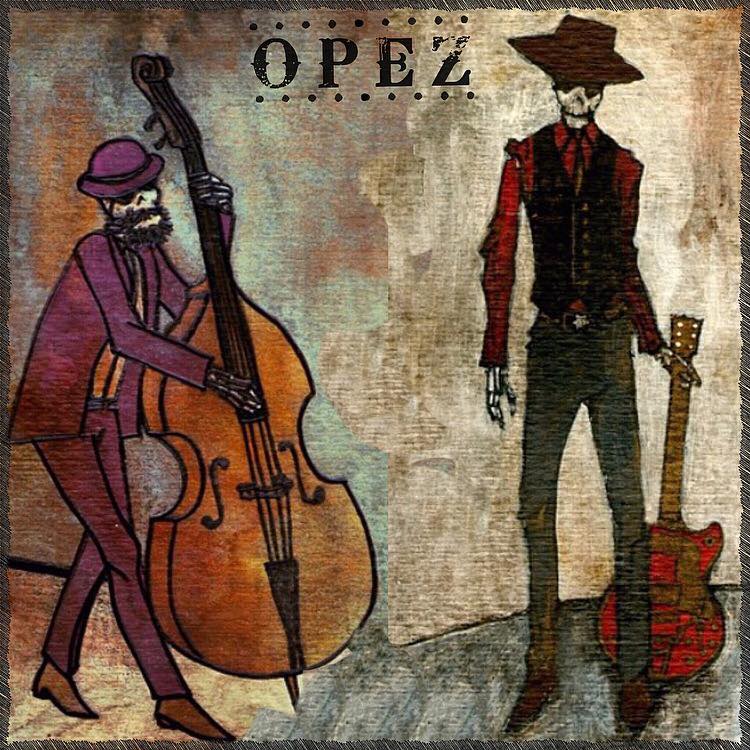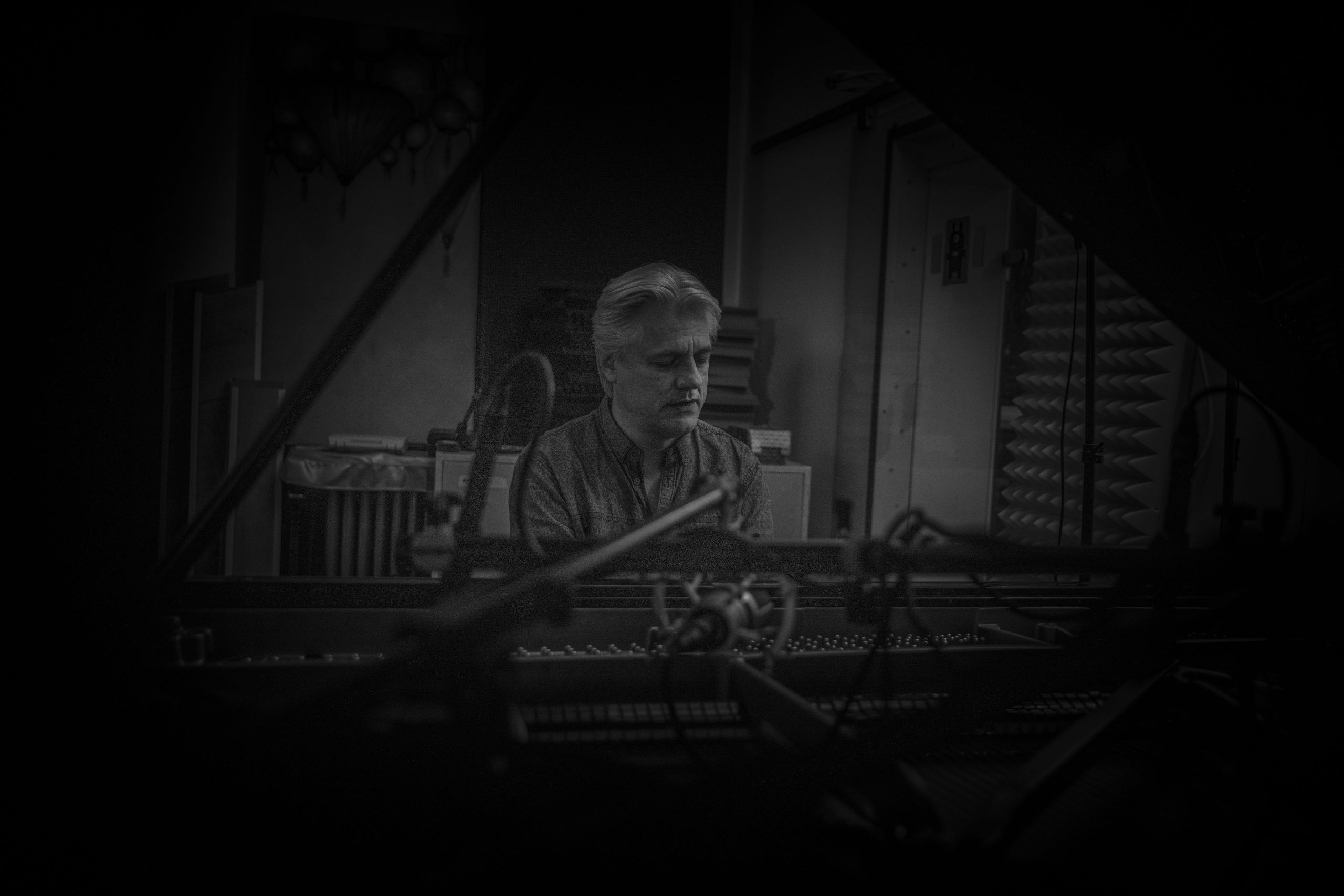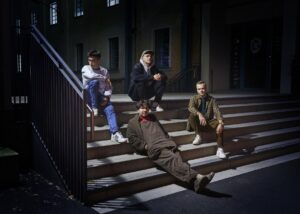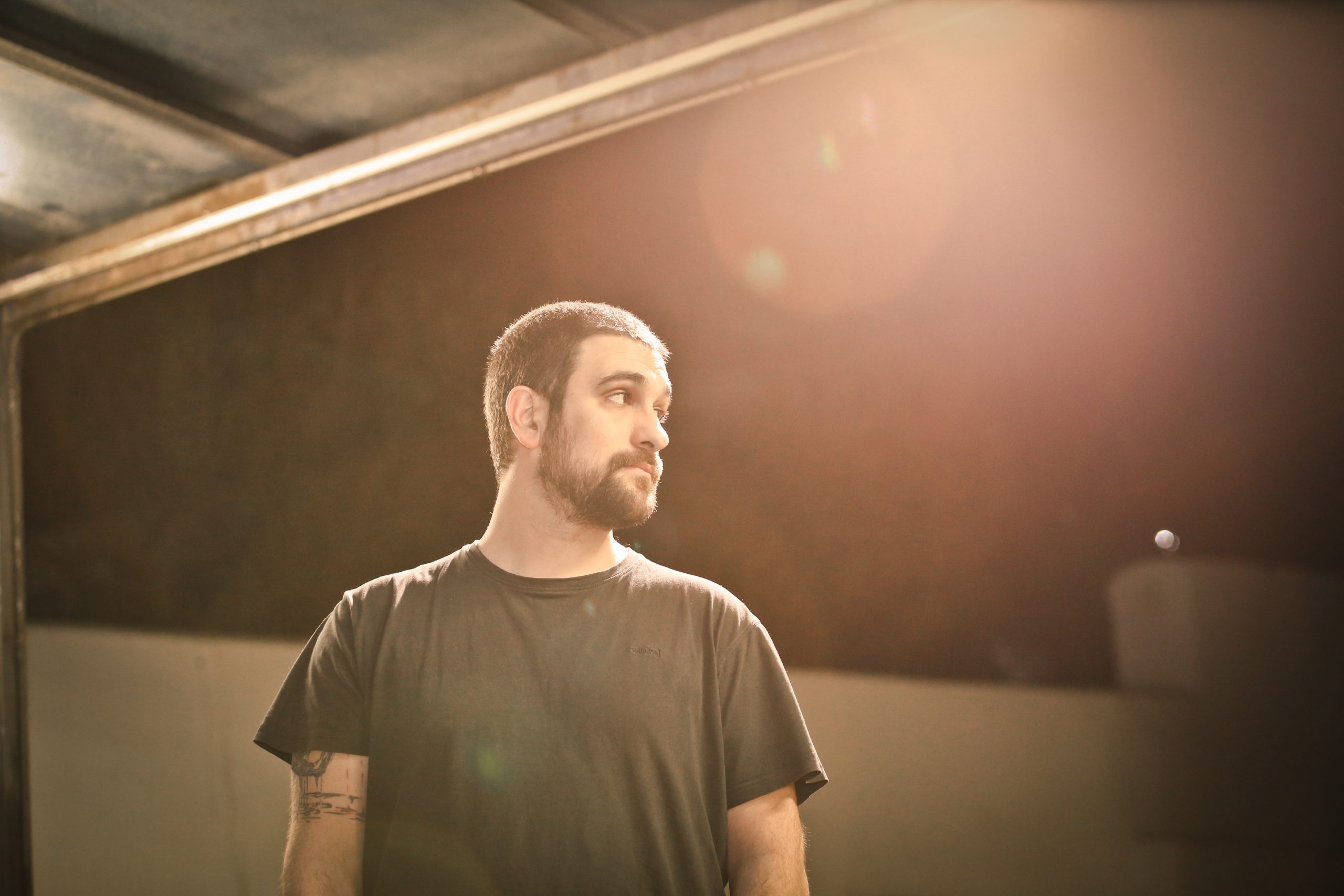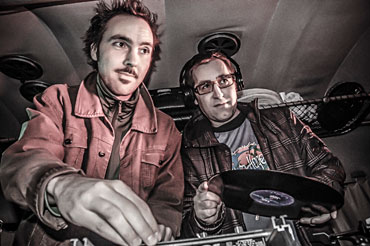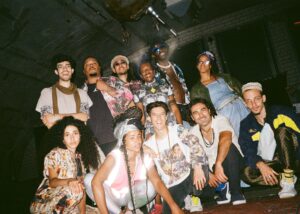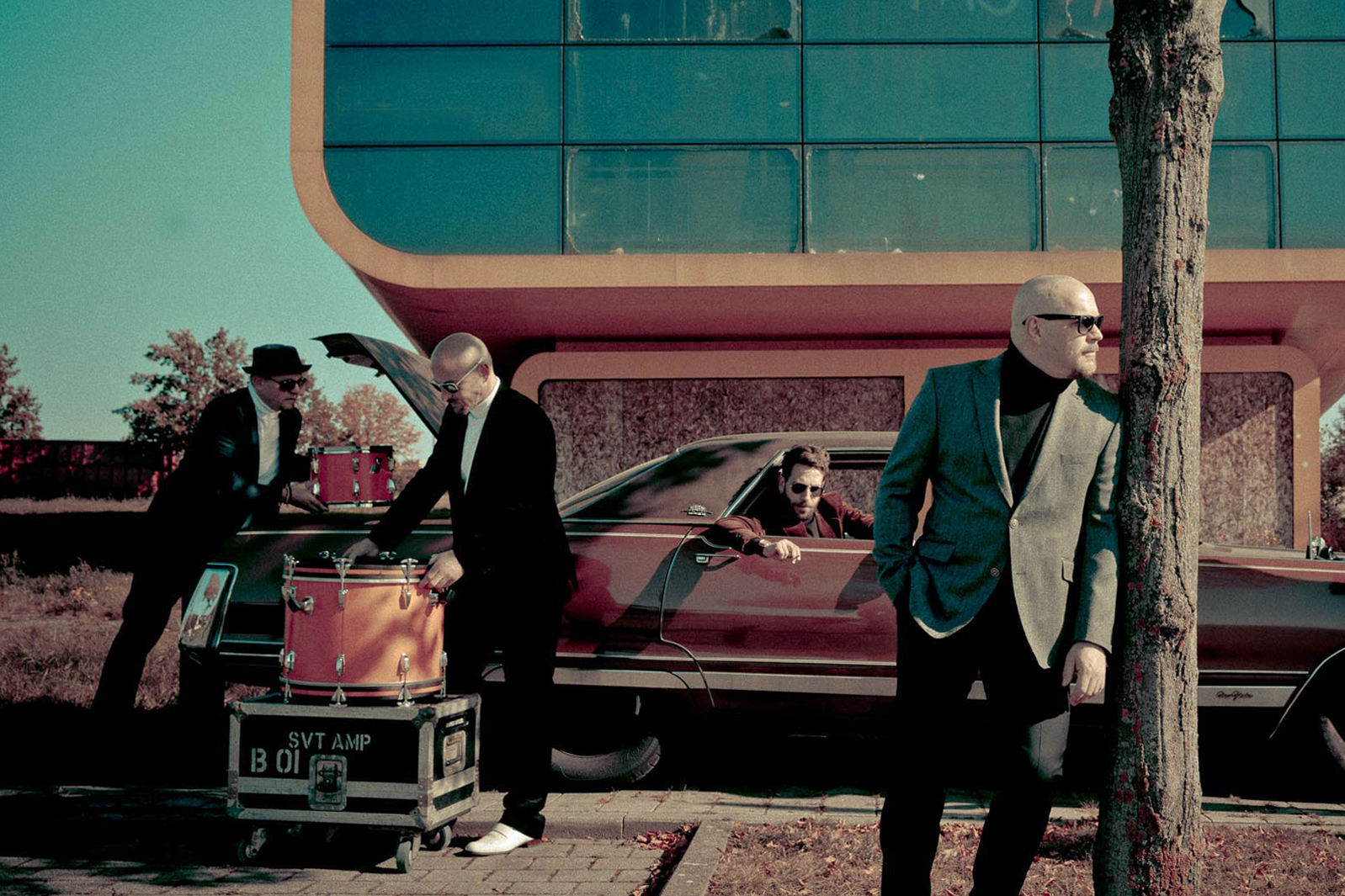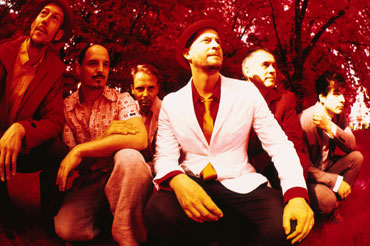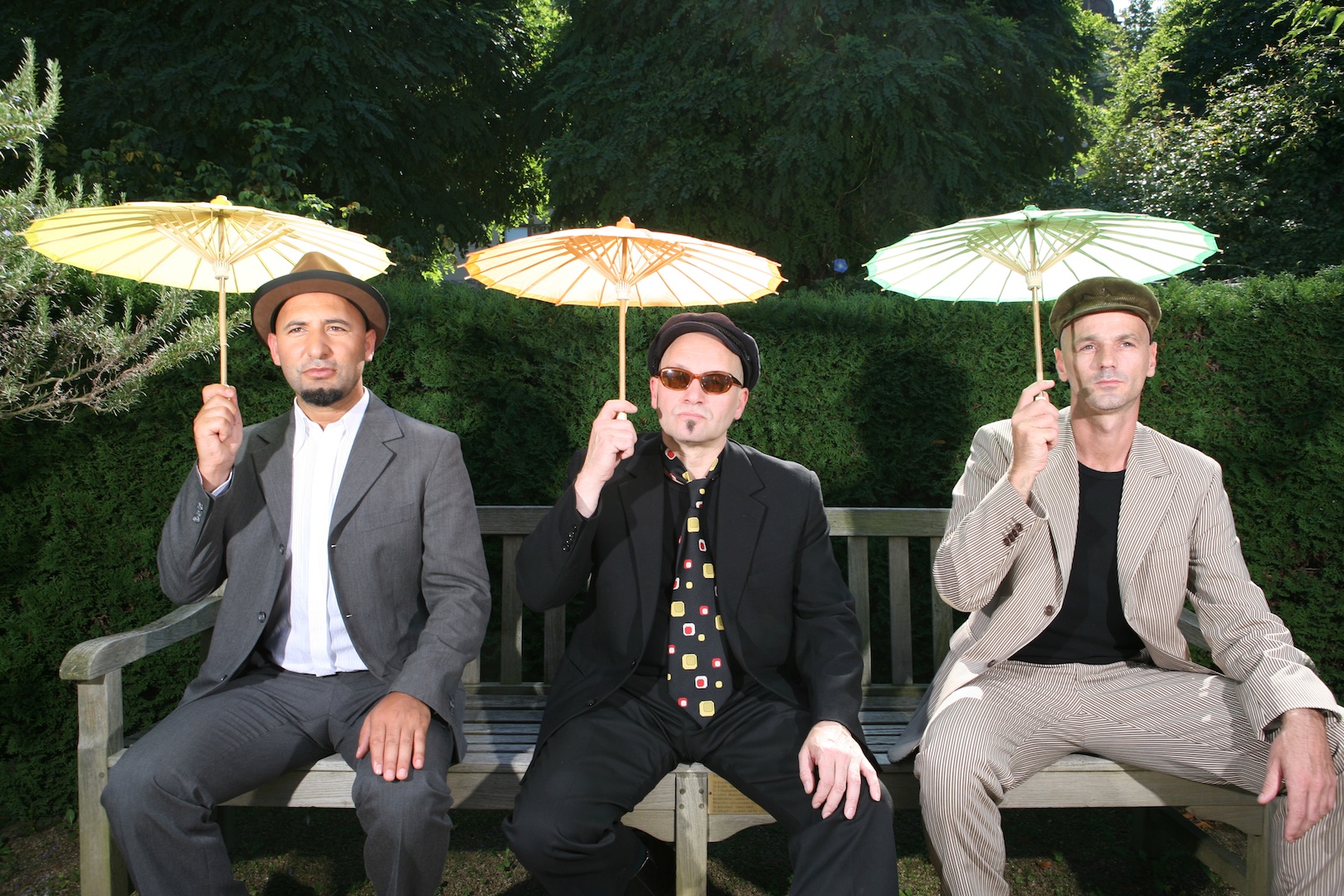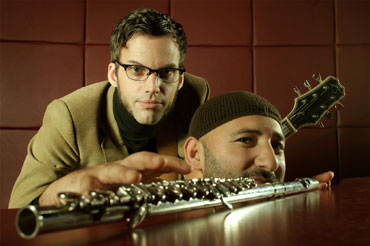Andrea Benini
Andrea Benini (born March 14, 1977) is a musician, music producer and composer from Cesena, Italy. His works span from modern jazz to electronic/club oriented music with frequent incursions into Afro, Funk and deeper grooves.
Andrea is the mastermind behind the band project MOP MOP. his new solo project is called “Drumphilia Vol. 1”- a journey inspired by early African electronic music and modern beats.
Bareto
Praised as heirs of Amazonic psychedelia and Chicha traditions, as well as sound innovators, peruvian band BARETO mix exciting versions of Cumbia classics with their own, unique compositions, in concerts that should be promoted as dance parties.
The group’s musical exploration began around 2003 with Jamaican Ska and Reggae, but quickly – and not giving up that original influence – BARETO then focused in Amazonian Cumbia and its psychedelic universe. Their last two records of original material, “Ves Lo Que Quieres Ver” and “Impredictable”, had been nominated for the Latin Grammy Awards.
“After plugging away through various stylistic incarnations, from the Ska of their debut
to the guitar-based Cumbia of their subsequent albums, it feels like Peru’s BARETO
have finally found themselves producing one of the best Latin American albums of
of the year in the process” Songlines, UK
“A soundtrack that’s both, retro space-age and engagingly futurist” The Guardian, UK
“La banda líder de la nueva escuela musical peruana” Vice, Colombia
Black Jesus eXperience
Ethiofunk master-trippers Black Jesus eXperience are a ten (plus) member co- operative of musicians and poets whose sound is rooted the rich soil of Melbourne’s multicultural garden. Eternal paradox cast in 21st Century groove.
Black Jesus eXperience deliver musical strength and beauty through the vocal prism of Hip-Hop and freedom of Funk, guided by Ethiopian singer of insightful truth Enushu Taye.
Don’t just take our word for it:
★★★★ “Beautifully layered and organic, trippy and hypnotic. This is the good stuff, don’t waste a drop of it”
Blues And Soul Magazine
“Ancient to modern sensibility. Rammed with more rhythm-stretching melody than its groove ought to have room for.”
The Guardian – John Fordham
★★★★ “Volcanic.. fusillades of brass and percussion.. spiraling rhythms.. starkly hypnotic.“
The Times – Clive Davis
Bruno Repsold Quinteto
Bruno Repsold is a bassist from Rio de Janeiro who has been an active presence on the music scene for the past 15 years, collaborating with numerous Brazilian and international artists, such as Clarice Assad, Leo Gandelman, Andre Mehmari, Mike Tucker and Seamus Blake.
In 2024, Bruno Repsold recorded his debut album with his quintet, featuring seven original compositions arranged in the classic jazz tradition: a space where everyone plays, listens, engages in musical dialogue, and has fun. The songs draw inspiration from life itself—musical and spiritual influences, friendships, family, and the myriad experiences that shape one’s identity. The album was recorded live during a two-day session in Rio de Janeiro.
Bruno Repsold Quinteto “Quimera” – link to various shops
Coladera
Coladera are two musicians from Brazil & Portugal, who have invited various musicians from other Portuguese-speaking countries like Cape Verde and Angola to participate on this album.
Their first official international release have crafted an exquisite and exploratory sound, adding new layers upon their individual and rich traditions. Singer-guitarist Vitor Santana from Belo Horizonte, Portuguese singer-guitarist Joao Pires are named after one of Cape Verde’s musical traditions, Coladeira – a form that borrows melodies from fado and rhythms from Brazil and Angola.
Sung mainly in the Portuguese language but with a couple of songs in Cape Verdean creole, their upcoming album “La Dôtu Lado” features guest percussionist Marcos Suzano, a Brazilian pandeiro master, and seamlessly pulses between the traditions of each country and also percusssionist Miroca Paris, who has been playing for many years for the Queen of Morna, Cesária Évora, with poignant lyrics about the spirits of the Orishas, deities worshipped by slaves who were shipped across the Atlantic to Brazil from West Africa often via Cape Verde. Indeed, Cape Verde was an empty island until the Portuguese empire found it in 1456 and it wasn’t long after when Cape Verde was central to the Portuguese’s triangular trade system strategy.
Coladera have released a previous long player back in 2013 but with little fanfare. Despite the modest release, they played at New York’s Summerfest and Joe’s Pub amongst other festival dates around Europe. Whilst both albums have flirted with Cuban rumba with striking Andalusian guitar flourishes, the project has always been Lusophone and inspired by close friendships and travel. For Vitor, a guitarist with grounding in classic bossa nova, the music of Coladera at times felt like a nostalgic trip exploring the dulcet and minimal groove of the guitar and voice.
All musicians have, at different points, lived or been at the coalface of their respective musical cultures within the Lusophone Atlantic triangle. Joao grew up listening to and learning fado, studied flamenco in Andalusia and has lived in Cape Verde, and Vitor lived with Joao for two years in Brazil and has lived and performed throughout Europe.
Da Lata
Da Lata is the brainchild of Chris Franck and Patrick Forge.
Da Lata blazed a trail for the progressive fusion of Brazilian rhythms with a contemporary dancefloor sensibility on their debut release in 1997, a version of Edu Lobo’s classic “Ponteio” (recorded with engineer/producer Lee Hamblin). This featured the Brazilian vocalist Liliana Chachian and was released on Joe Davis’ then nascent Far Out Recordings. The track won support across the worldwide DJ community crossing over easily between house and more eclectic spinners. Joe Claussell, Francois Kevorkian, Danny Krivit, Gilles Peterson, Rainer Truby, MAW, Jazzanova, KJM were all big supporters. However due to Chris’ involvement with Smoke City the project lay dormant for a few years. Nevertheless, Patrick and Chris had an ace up their sleeve, a song they had demoed back around the time of Ponteio. In 1998 they finally recorded “Pra Manha” with engineer/producer Toni Economides and immediately were signed to Chris Blackwell’s Palm Pictures label. “Pra Manha” was released in 1999 and again garnered huge support worldwide. The following year the debut album “Songs From The Tin” featuring Liliana Chachian, percussionist Oli Savill and original Stomp and Batu member Carl Smith was released to critical acclaim. The live band toured the UK, America and Japan, with a memorable show for Body and Soul in Central Park being a notable highlight. Drummer Tristan Banks, keyboard and vocalist Mike Lindup (Level 42) and bass player Andy Lafone added their formidable talents to the line up.
Their next release for Palm, “Remixes”, was a compilation of their reworkings of tracks by other artists including Femi Kuti, Bebel Gilberto, Carlinhos Brown and Sly and Robbie which showcased their growing ability to create a synthesis of organic and programmed elements. Chris’ formidable instinct for the groove always ensured the tracks would have that swing and the studio and production skills of Toni Economides ever crucial to the development of the Da Lata sound. Remixes also featured a totally new tune “Golden” and their version of “Ponteio”.
Reassembling for their second album, no longer with vocalist Liliana Chachian or percussionist Oli Savill on board, 2003’s “Serious” saw Da Lata diverge into a broader “World” fusion sound with the huge Afro-House groove of the title track featuring cosmic jazz sister Bembé Segué and African singer Mamani Keita leading the way. Baaba Maal, Nina Miranda, Jhelisa Anderson, Pedro Martins and Courtney Dennie also featured as guest vocalists.
The second incarnation of the Da Lata live band once again toured extensively to support the release of “Serious”. Festival highlights included Coachella, Glastonbury, North Sea Jazz, Womad and Roskilde.
Although much water has passed beneath the bridge between then and now, Da Lata has never been entirely inactive, the intervening years being peppered by the appearance of the odd remix and one-off release. In 2004 “Ronco Da Cuica” a radical reworking of Joao Bosco’s song appeared first in Japan on the Kyoto Jazz Massive 10th anniversary compilation, and later on Danny Krivit’s “In The House” on Defected. Then in 2008 “This Is Not Your Job” a full blooded Afro-House excursion featuring the voice and kora of Diabel Cissokho.
In 2011 Chris and Patrick started to knock heads about how a new Da Lata album might take shape even though they were no longer contracted to Palm Pictures, deciding to finance the recording themselves and eventually to take the final leap into self-releasing. The first taste of the forthcoming album comes in the shape of a single which will be released on a limited edition vinyl 7” and digitally, it’s a version of The Jam’s “Going Underground”, the b-side is a classic Da Lata instrumental “Places We Go”.
Gyedu-Blay Ambolley
“Afro-American jazz, soul and funk with Ghanaian highlife, enhanced by his signature Simigwa style and powered by polyrhythms.”
Pan African Music
“Gyedu-Blay Ambolley continues to explore the infinite possibilities of his afro-groove cocktail as militant as it is danceable.”
FIP
“Wonderful”
Debbie Golt
Gyedu-Blay Ambolley and Hi-Life Jazz is the new album from revered Ghanaian highlife and Simigwa Do exponent Gyedu-Blay Ambolley, known for his deep, soulful, and funky highlife sound and sometimes referred to as the “James Brown of Ghana.”
A 360-degree musical tour de force as evidenced by his impressive and eclectic back catalogue, Gyedu-Blay Ambolley and Hi-Life Jazz makes his 35th album release to date. His third release on the German Agogo label, the release sees him breathing new life into some jazz classics, revisiting works by John Coltrane (Love Supreme), Thelonius Monk (Round Midnite), Wayne Shorter (Footprints) and Miles Davis (All Blues) alongside some brand new compositions, powered by polyrhythms and his signature highlife style. The record coincides with multiple live dates through October visiting Paris, Amsterdam, Rotterdam, Lisbon, Copenhagen, Brussels, Gothenburg, Malmo, Saubriges & Mugron.
Since his breakthrough in the early 1970s with his own Simigwa style he has shared stages and studios with some of Ghana’s greats like Ebo Taylor and Sammy Larteh with whom he played In the Uhuru
Dance Band. Together they founded the Apagya Show Band in 1974. He has since continued to push back boundaries, embrace, explore, create and cultivate an impressive catalogue of work. In recent times, he has become a go-to example of Ghana’s rich traditional music form, so much so that he has performed tirelessly through Europe and US and most notably at Utrecht’s Le Guess Who Festival and the Montreux Jazz Festival.
Hidden Jazz Quartett
The members of the HJQ are some of the best Jazz musicians from Germany. These guys played along with Wayne Shorter, Lionel Hampton, Randy Crawford, Maria Joao… just to name a few.
The music of the HJQ is groove orientated Jazz and Soul. on their debut album ‘Raw & Cooked’ you will find a package full of new heavyweight compositions, as well as cover versions from ‘Lush Life’ and ‘Nardis’.
The band:
- STEPHAN ABEL – sax
- LUTZ KRAJENSKI – hammond
- OLAF CASIMIR – bass
- MAZE MEUSEL – drums
- ULLE ROHDE – guitar
- CHRISTIAN DECKER – production
- RALF ZITZMANN – production
Hoodna Orchestra
The Hoodna Orchestra is a 12 member orchestra who studies and investigates the African origins of western popular music. The Orchestra was formed in 2012, in the south side of Tel Aviv, by a group of musicians, and it functions as a collective and a record label.
Hoodna’s musical director is the guitarist and composer Ilan Smilan. The cultural and musical environment that surrounds the group has a great effect on its creative process. Exposure to Ethiopian’, Eritrean and Arabic musical traditions, coupled with an ongoing study and exploration of different jazz styles, creates a unique blend which has made The Hoodna Orchestra one of the most appreciated and sought-after live shows in Israel.
Jembaa Groove
It’s been a busy time for the Berlin based collective. Having stepped out of the shadows with their debut album Susuma in spring 2022, they’ve hit the ground running, recorded a session for BBC 6 Music, released a live EP and performed various shows through Europe including a recent stop at Groningen ESNS. And to top that, they’ve just confirmed a showcase at the inaugural SXSW festival in Austin Texas this coming March.
Their poly-rhythmical debut album Susuma was built around the West African highlife tradition and the spirit of classic US jazz and soul. Delving into a wealth of influences from across both sides of the Atlantic as well as the Berlin scene – hip hop and jazz – the group’s musical vitality, journeying philosophy and indeed their band name, comes from the energy and spirituality of their take, and on the rhythms that feed the groove. Utilising the musical techniques, cultural context, and spirit of Ghanaian highlife they are as much influenced by the creativity of highlife pioneer Ebo Taylor and Dr. K. Gyasi as they are to the US groove machines of say Charles Bradley or Lee Fields.
The conception of Jembaa Groove happened late 2020, when band leaders Yannick Nolting (bass, composer, producer) and Eric Owusu (percussion, vocals, songwriter) met while picking up their young sons from the local playground. Yannick is from Germany and spent his formative years producing and playing with Lusophone artists in Lisbon.
Eric is from Ghana (although he spent a large part of his life living in Nigeria) and has musically grown as a reputed percussionist working, recording and performing live with artists like Ebo Taylor, Pat Thomas, and Orlando Julius (who he lived with whilst living in Accra).
Comprising seven band members, hailing from various corners of the world, their practice sessions are driven by a wild mix of languages and cultural expression. Listening to Susuma, you can hear Eric singing in Ga, (one of several languages spoken in the city of Accra, Ghana), Yoruba and Twi and pidgin English.
Garnering a smattering of support from the media world like BBC6, KEXP, KCRW, Worldwide FM, FIP, RFI, Rinse FM, WDR Cosmo and enough stations round the world off the back of their debut album Susuma, Jembaa Groove are causing a storm with their hybrid West African meets US soul & jazz sound.
“Jembaa Groove is all about positive vibes. We try to promote positivity, togetherness and respect. But also try to remind others as well as ourselves that destiny lies in our hands, and that you can’t take things for granted. If you want something, go for it, but respect the people!”
krajenski.
An organist, a saxophonist and a drummer – the classic organ trio has been arousing special expectations to Jazz listeners since the glory days of Jimmy Smith, Groove Holmes and the McDuffs and McGriffs. The organist can spread out, the saxophonist can follow him and the drummer swings and provides the groove “in the pocket”.
With their album “B-3 Vol.1” the Hanoverian Lutz “Hammond” Krajenski aka krajenski. on the B-3 organ, Ben Kraef from Berlin on the saxophone and Peter Gall from southern Germany on the drums break new ground even if the old path of the Hammond-infected Blue Note refinement always remains in view.
We owe this resurrection of the classic format “Hammondtrio” to three musicians who are gliding to revitalize jazz history. krajenski. It is no coincidence that it has been nicknamed “Hammond” since the first career steps. His organ collection now includes 15 instruments; ascending trend. Not only is he a brilliant instrumentalist, he also made a name for himself as an arranger for his own big band as well as for other ensembles and artists. Clients included musicians such as Tom Jones, Randy Crwaford, Mousse T., Ulrich Tukur, Sarah Connor and Inga Rumpf. Krajenski became known to a wide audience primarily as an arranger, pianist and musical director for Roger Cicero.
His two fellow musicians on “B-3 Vol. 1” both studied in New York and belong to the crème de la crème of the German Jazz scene. The award-winning Berlin saxophonist Ben Kraef has played with greats such as Lalo Schiffrin, Archie Shepp, Phil Woods and John Abercrombie. His debut album “Berlin-New York” was released in 2010 by Act (with sidemen John Patitucci, Marcus Gilmore and Rainer Boehm). Drummer Peter Gall, on the other hand, has already shone alongside luminaries such as the Kurt Rosenwinkel Trio, the NDR Big Band, The New York Voices, Take 6, Web Web, Thomas Quasthoff, Nils Landgren, Max Herre, Joy Denalane and the Dieter Ilg Trio.
Laíz & The New Love Experience
Transdisciplinary artist Laíz was born in the city of Jundiaí (Brazil) in the state of Sâo Paulo in 1999 and migrated to Germany in 2019, where she started her musical journey in the Berlin Jazz scene by blending Latin Groove, Free Jazz and Afrobeat with Brazilian Hip Hop.
Her first album “Ela Partiu” (Portuguese: she left) will be released in co-op by the labels Besser Samstag and Agogo Records. “Ela Partiu” by Laíz & the New Love Experience will be released in September 2024. An ode to the Brazilian music tradition and Brazilian Hip-Hop, seeking innovation in the genre by boldly blending diverse rhythms and instrumental compositions.
“Ela Partiu” consists of 20 musicians, sung in 7 different languages, echoes Laíz‘ story of migration. From the cultural imbalances faced in Europe, to the joy of blending Southern heritages, to the power of culture and our cosmovision, this album fuses magical lyricism and instrumental storytelling in a gentle and vibrant way.
this album is the product of a co-creation process at Nima Studio in Hildesheim, the first full album of the Laíz and NLE to see the light of the world, with many more to follow in times ahead.
Linear John
In this jungle of hustlers and cop-outs it’s the time to take over. Linear John’s debut album ‘Hits with a Twist’ is out now (in September 2016). It’s provocative and compelling. It’s eclectic without crashing down one musical barrier. Respect the tradition.
This is an invitation to the world of peculiar sounds, odd time signatures and the forms you’ve never encountered before. Just when you thought that you’ve heard it all, Linear John comes out with his debut album, “Hits with a Twist”. In less than 45 minutes of playing time he manages to be tough in the night, quite romantic and more than eccentric while not forgetting his protective nature. These and many his other moods are found in ‘Hits with a Twist’, an album released by Agogo Records. ‘Hits with a Twist’, a stunning debut album contains eleven brand new songs created solely by Linear John. He’s from anywhere you like and he sings and plays; Saxophones, analog synthesizers and everything in sight letting his band, The Raising Eyebrows, to take care of the rest.
A man with many tasks to complete. He’s been surrounded by mysteries and now, for the first time, he’s ready to take you along into his inner musical worlds. This is the showing where it should be at.
Linear John likes to do things his way. It’s the way of going forward, towards the complete synthesis of all influences he’s received. And of course, always leaving chance a chance. This is a new must. Linear John debut album is coming to your smart phones and if you’ve been smart enough, it’s also coming to your record players.
Watch out and you’ll get Hits with a Twist© and they have never felt so good.
Instagram: linear_john
Lutz Krajenski plays Hits Agogo
As Agogo Records celebrated its ten years anniversary in 2017 it’s about time for an appraisal. It’s about time for a special album release dedicated to the labels rich history and vast catalogue comprised of many variations of global club music. An album that’s way more than just a best of- / remix-compilation sampler.
Our anniversary release is, similar to our back catalogue, multi-faceted and iridescent. It’s a body of work created by an exceptionally gifted Jazz arranger and talented keyboarder, an analogue compendium of digitally crafted Agogo classics and a new and oftentimes radical re-interpretation of groovy, electronic club music that has been released via our imprint throughout the past decade. And sometimes it’s just timeless quality music sporting many emotional nuances and gentle dramaturgic arrangements that’s yet able to kick some serious ass on the dancefloor every now and then.
Agogo-mastermind Ralf Zitzmann commissioned arranger and piano player Lutz Krajenski, who has worked with artists like Roger Cicero, Tom Jones and Manfred Krug in the past, to re-interpret and revisit ten classic tunes from the labels back catalogue for this album. Not knowing to which places this journey would lead to Krajenski started to work on tunes originally written by Mo’ Horizons, Mop Mop, Da Lata or the The Juju Orchestra and re-arranged them in a way that they obtained a new feel, a new meaning as well as a radically new sound when they were recorded with the help of various guest musicians stemming from Krajenski’s inner circle of friends in the music scene as well as the singer Alana Alexander who played an important role in shaping the sound of the album.
Hailing from New York City Alana Alexander was raised on a very distinct diet of music from an early age onwards and especially inspired by the sound of Gospel choirs as her father used to be one of the most renowned preachers in the Bronx area. Coming from this perspective and background she went on to study Vocal Jazz at the Manhatten School Of Music and fully focus on her musical talent which, amongst others, led to stage appearances at the famous Apollo Theatre in Harlem alongside greats like Eric Benet, Faith Evans, Keiko Lee and Angie Stone as well as working as a songwriter for the eight times Grammy winner Jay Newland.
From Ralf Zitzmann’s perspective Krajenski left a very distinct mark on the albums sound and therefore the final outcome is way more than just an anniversary album. That’s why it’s called „Lutz Krajenski plays Hits Agogo“. For Krajenski it seems like the original tunes sound more like remixes of his own reworks although the albums approach is a contrary one.
This vital paradigm shift is what turns „Lutz Krajenski plays Hits Agogo“ into a future classic, an album that seems to become more exciting, detailed and fascinated with every listening session, weighing in an additional gem named „Us“ – an original song written by Krajenski and Alexander perfectly complementing the aforegoing cover versions and reworks which will surely gain a classic status within the labels catalogue within the shortest of time.
mattimatti
mattimatti are two friends living in different countries – Germany, Berlin and Sweden, Malmoe. they are travelling around the world playing their music, a mixture of rhythmic, suggestive and meditative soundscapes. Matti & Matti began playing improvised tunes on sitar and hang on the street while travelling through Sweden and Germany. this lead them to be invited to numerous festivals all over Europe while constantly developing their music and sound. since then the set has added new instruments such as a drum kit with hang, African harps, Sitar, guitar, Harmonica, Clarinet and vocals on top of it extending the sound with a space echo.
both guys are still based in Berlin & Malmoe and work together with the contemporary circus, dance and music group „kollektiv knaster“.
Mo’ Horizons
Mo’ Horizons enter a new chapter with their seventh album and remarkably, celebrate 25 years of their exultant and globally enriched, forward-thinking, electronic grooves. Featuring guest singers, Gyedu-Blay Ambolley and Noam Bar Azulay. MangoWoman is a fiery and sample-heavy blend of future-funk, balearic, Ghanaian highlife, Brazilian drum n bass and lo-fi hip hop and set to be released on their longstanding label Agogo Records, on 6th October.
Spanning over three decades DJ and production duo Mo’ Horizons, led by Mark Wetzler & Ralf Droesemeyer, is a relentless force on the global groove scene and this incredible achievement, 25 years after their furtive production steps, is testament to remaining on-point, undeterred by scenes and artists, coming and going.
Familiar and warming sounds pervade Mango Woman; the call of the Brazilian cuica, the snapping snares, rolling breakbeats, swooning sax licks, and warm and dreamy beach-scene vibrations. Yet there are brand new tricks; Arthur Lee’s gravelly voice underpin a Funkadelic groove in Havanna B-Boys and the mesmeric vocal samples from Anglo-Portuguese singer Guida de Palma (Jazzinho) on album opener Anotha Bossa – they
both shine as lead singles.
Ever-present in the contemporary jazz infected club culture of the early 2000’s, alongside contemporaries like Gilles Peterson, Jazzanova, United Future Organisation, Kruder & Dorfmeister, Fila Brazillia and Dining Rooms, it was a live show of acid jazz pioneers Galliano, in Hannover in 1995, that would act as a turning point for the duo. And having always immersed themselves in the ‘digging’, it was to labels and compilations from the likes of Something Else, Acid Jazz and then Soul Jazz, Ninja Tune and Freestyle Records that would feed their insatiable appetite for new realms of music from all ends of the Afro-Latin-Brazil-Funk and drum n bass spectrums.
Mop Mop
Andrea Benini (born March 14, 1977), also known as Mop Mop is a musician, music producer and composer from, Cesena, Italy. He has worked in jazz, funk and club music. Benini began playing guitar at age 10 and he started playing drums at age 14. At the end of 1999, Benini moved to Bologna and he attended the “Discipline dell Arti, della Musica e dell Spettacolo” (DAMS), pursuing the study of African-American music and Contemporary music.
From 2000 to 2003 Benini worked as journalist for the Italian magazine “Percussioni” interviewing musicians like Joey Baron, John Riley, Terry Clarke just to name a few. As of 2005, his current project is Mop Mop, a funk/afro/jazz mix including musicians Alex Trebo on piano, Pasquale Mirra on vibraphone, Guglielmo Pagnozzi on sax, Bruno Briscik on bass and Danilo Mineo on percussions. Mop Mop debut album “The 11th Pill” was released by Tam Tam Studio in 2005 and later re-released by P-Vine Records for the Japanese market. The first single ”Perfect Day Feat. Jackson Sloan” was released by Dejavu Records in 2006 with a remix of Schema Records artist Gerardo Frisina.
In 2007 “Perfect Day” was selected by Adrian Gibson for “Messin Around 5”, the London Jazz Cafe compilation featuring artists like Nostalgia 77, Mark Murphy, Sleepwalker, Soul Jazz Orchestra just to name a few.
In 2008 Benini has produced Mop Mop’s second album entitled “Kiss oF Kali”, released by the German label Infracom Records in 2009. The album features Down Beat Critics Poll winner Gianluca Petrella on trombone and Alan Farrington on vocals. Infracom Records released Mop Mop’s third album “Ritual Of The Savage” in 2010. The album includes the UK’s singer Baby Sol ( backing vocaling for the likes of Amy Winehouse, Joss Stone, Nate James ).
In 2012 Mop Mop achieve the international film business as part of Woody Allen‘s “To Rome With Love” soundtrack with the song ” Three Times Bossa “, composed by Andrea Benini/Alex Trebo and produced by Tam Tam Studio.
Mop Mop music is released by labels like Sony/BMG, Universal, Wagram, Infracom, Freestyle, P-Vine, Rambling and supported by DJs like Gilles Peterson, Toshio Matsuura, Michael Ruetten, Pete Isaac, Simon Harrison just to name a few.
During the last years he has performed in Italy, Germany, France, Poland, Hungary, Croatia, Bosnia, Spain, Turky, United Kingdom, United States, Russian Federation, appearing in clubs, jazz clubs, theatres, festivals, national radio and television. Benini has produced three albums and several singles for Mop Mop project and remixed artists like [re:jazz], Bajka, Jazzinvaders, Bahama Soul Club, Valique, Rime.
Mulatu Astatke & Black Jesus Experience
Mulatu Astatke is the Father of Ethio-Jazz and one of Africa’s most influential and enduring musical figures. Black Jesus Experience is a community of artists, centred around a twelve piece global-funk-machine born of Australia’s vibrant multiculturalism.
Mulatu and Black Jesus Experience met in Addis Ababa in 2009, embarking on both a musical relationship and a friendship that has led Mulatu Astake to describe Black Jesus Experience as, “My favourite backing band” and, “…they’re family.”
Mulatu‘s great contribution to music has been to to combine Jazz and funk grooves with Ethiopia’s distinctive pentatonic scales. His musical genius is the sensuality and sophistication with which Mulatu contrasts these minimalist scales with richly chromatic harmony.
But Mulatu’s equally great contribution has been to share both his enduringly unique modernity and Ethiopia’s timelessly spiritual music with the world. Black Jesus Experience treasure the special relationship of generosity, mentorship and collaboration they have been privileged to share with this master musician.
Natalie Greffel
Natalie Greffel was born in post-colonial Mozambique and raised in Denmark from infancy. After moving to Berlin in 2010 to attend a music conservatory, and while engaged in various projects that exercised her stylistic flexibility, Natalie felt an increasing disillusionment with European Jazz; she instead felt drawn to the Afro-Brazlian music her mother played during childhood, which in turn began to reveal a cultural connectivity between Mozambique and Brazil.
Through her close interrogation of identity, this rising Berlin-based talent succeeds in investigating the edges, re-sketching new borders and embracing the many facets of herself, both personally and musically. The disrupted histories of the African diaspora, the ravages of imperialism and the expressionism of a common tongue are all etched into the narrative of Natalie’s stunning debut solo album “Para Todos”. The album evokes warmth and unexpected intimacy, newness and familiarity, as it gently deconstructs the paradigm of Brazlian music, reforming it not as a commodity to be sold, but as a recollection of dream-state memories.
Nautilus
NAUTILUS is a trio centered around drummer Toshiyuki Sasaki, formed in 2014 along with its Bassist Shigeki Umezawa and Keyboardist Daisuke Takeuchi. Their distinctive style, which can be summarized as the modern rare groove, embodies a mixture of jazz, funk, disco, soul and even hip hop. The conception of NAUTILUS is drawn not only from the composition “Nautilus” written by Bob James, but also from an American submarine that actually existed, thus resembling their contemporary style that carries on the rare groove music of the 70s in an abyssal imagery.
Sasaki’s versatile, yet solid drumming combined with Umezawa’s full-bodied, powerful bass and Takeuchi’s classically-trained prowess produces an exceptional sound unique all on its own.
2014年ドラマーである佐々木俊之(ds)をリーダーとして、梅沢茂樹(bs)、竹内大輔(key)と共に結成され、ジャズからファンク、ディスコ、ソ ウル、ヒップホップまで消化した多様な音楽性を武器とした現代版レアグルーヴ体現バンド。Bob Jamesの楽曲”Nautilus”から着想を得て、実在した潜水艦Nautilusとのイメージを織り交ぜて、70年代のレアグルーブサウンドを追求 しつつ、深海にいざなうようなディープな世界観を作り上げている。オリジナルの楽曲は全て佐々木の作曲によるもので、ドラマーならではリズムの仕掛けなど がふんだんに盛り込まれつつ、クリス・デイヴやマーク・ジュリアナに代表されるようなテクニカルなスキルも披露されており、さらには楽曲のメロディセンス やコード感などドラム以外の才能も発揮している。多ジャンルで活躍している佐々木のしなやかかつ力強いドラミングと、梅沢のブラックミュージック仕込みの 太く絡み付くようなベースライン、竹内の持つクラシックのテイストが混ざり合い、ありそうでなかった、他に類を見ない極上のグルーヴを生み出すサウンドに 仕上がっている。
Onom Agemo & The Disco Jumpers
Led by the restless saxophonist Johannes Schleiermacher, this Berlin-based quintet (which is now and then completed by the Danish-Mozambiquan singer Natalie Greffel or malian guitar legend and singer Ahmed Ag Kaedy) has been pushing the boundaries of Afro-Funk to its most extreme, incorporating explosive Jazz improvisations, far out Krautrock, bubbly keyboard sounds and Psychedelia to create a spell-binding musical melange completely their own which proves that is perfectly possible to keep one´s feet firmly on the dancefloor while heading for the stars in a glittering spaceship.
the band:
Johannes Schleiermacher – ts
Jörg Hochapfel – synth
Kalle Zeier – gui
Kalle Enkelmann – bass
Bernd Oezsevim – dr
album info:
The group has developed a unique groove and style of playing, constructing a collection of eight songs, that throws together tight and funky influences from Marocco and Ethiopia with crunchy analogue synths, spacey organs and effects, and fluid sax and flute lines for a sound that’s all their own.
The LP is a collection of compositions by travelling sax man Johannes Schleiermacher, inspired by his journeys through the world. The band even travelled to Morocco for playing and recording with a quartet of percussionists/ singers in the Issawa tradition, a Sufi Trance Brotherhood in central Morocco.
Onom Agemo and the Disco Jumpers have been playing together for years, and it shows. Taking Schleiermacher’s compositions, the group rehearse the songs, play them live to finalize arrangements and get feedback from friends, before recording the tracks to different 4-track tape machines, mostly at drummer Bernd Oezsevim’s rehearsal space. Take the track “Cool Runnings” for example: locked in the groove, the intertwined sax and synth melody moves up and down the Anichihoye scale. Not to be confused with the comedy of the same title, the track is named after a bar in Berlin-Friedrichshain, where friends of the band put on their night Tropical Timewarp.
This interlocking of groove and melody is a signature element, and also inspired the title of the album. “Cranes and Carpets” alludes to changing patterns, and how the parts of a wider whole can work together in synchronicity. Combine an almost telepathic group intuition with the fact that Schleiermacher also engineered and produced the record, and the pieces start to add up to why the Disco Jumpers sound like they do.
It’s an authentic mix of North African rhythms and modes, live jazz musicianship and analogue synths that’s reminiscent of electronic African pioneers like William Onyeabor and Manu Dibango as much as modern ensembles like The Heliocentrics. While the album sounds like it could have been discovered on a dusty old tape down a Marrakesh marketplace, it has a modern twist in the neat craftsmanship and tight arrangements that ensures a blend of styles that couldn’t be anyone else.
Oonops
Beside his vinyl only show on Brooklyn Radio OONOPS is spinning banging club sets to relaxed mixtures for vernissages, museums or theaters. And furthermore he works as a product designer and he’s listed in the top 50 of Germany’s best table tennis player, now focussing all his skills in an event which will bring all this together. Keep in touch and follow OONOPS wherever its comfortable for you.
Opez
Describing their style as „Latin Desert & Funeral Party“ music, Opez clearly go their own special way. But listen to the debut album „Dead Dance“ and you will find that this path is quite an exciting one. Set in a haunting environment of acoustic instruments and an expertly stylish production, the twelve songs recorded by duo Massi Amadori und Francesco Tappi are a journey into a twilight world of emotion and imagination.
If you take an off-road trip to the region north of Perugia and south of Firenze, west of Livorno and east of San Marino you will find a number of little recording studios. This is Italy’s heartland you pass through when you travel down from Milano towards Rome. It is exactly here where multi-instrumentalists Massi Amadori (guitars, slide guitar, percussions, ukulele, freeze sound & harmonium) and Francesco Tappi (double bass, bows, whistle) recorded „Dead Dance“. Les Paul or Django Reinhardt immediately come into mind during a first listen, even the Mississippi Delta blues sound or Billy Vaughn’s happy orchestral sound being turned completely upside down. But “Dead Dance” has its own individual melancholy, a lonely sound supervised by Italian afro-jazz-fusion expert Andrea Benini of Mop Mop, not too far away from Angelo Badalamenti’s mysterious soundscapes for David Lynch’s „Twin Peaks“ series, especially on the dark and entangling “Sanfisa”.
With additional musicians like the two percussionists and drummers Fabio Paglierani, an expert in dub who brings a echoing twist to the sultry groove of “Adriatica” and the first single and video “Carlos Primero” or Fabio “Mocambo” Tozzi who puts “Estelita”, “Diavolanza”, “Malinco” and “Libre” into an authentic Fifties environment “Dead Dance”
is a band affair. The vocals of Annalisa Bartolini (“Carlos Primero” and “Sangoda”) as well as Dimitri “Didi” Mazzs (“Malinco”) add to the complete picture. As Opez have been very strict about their acoustic appearance, the more they are happy now about the result, „Tristu“ with its folk textures followed by the near tex-mex balladry of „Corolla” are two of the many highlights on “Dead Dance”. They were cut directly to tape, no overdubs or long mixing sessions involved. This is why “Dead Dance” sounds very spiritual, almost out of the real world: „To be honest, we would love to play our music in churches. We are not your normal type of rock band, you know“, says Massi Amadori, who is the main songwriter in the duo and responsible for all compositions on the album. Although “Dead Dance” sometimes feels reminiscent of the Cowboy Junkies’ romantic Americana or Los Lobos’ truthful adaption of traditional cumbia or bolero, “we see ourselves as very Italian, very local.”
The stunning artwork and the accompanying video were created by Aimone Marziali who is also one of the producers responsible for the sonically enhanced “Balera Del Mar”, the closing tune on the album. Creating a mixture of the classic pre-Raphaelite drawings by 19th century painter Dante Gabriel Rossetti and what George Yepes did for Los Lobos on their „La Pistola Y El Corazón.“ album, Marziali is an integral part of the Opez cosmos. „Of course, the artwork is a crucial to what we want to achieve,” adds Amadori. “Our music is very visual, very sensual and emotional. It is not only about an acoustic experience but it appeals to all senses.”
Rhabdomantic Orchestra
Born in 2014, Rhabdomantic Orchestra is an open collective of musicians based in Turin led by composer and multi-instrumentalist Manuel Volpe.
The band have released 2 albums with the german label Agogo Records (K7 group) gaining the favor of international press and radios worldwide (FIP Radio France, Deutschlandradio Kultur, Rai Radio 3, Itapema (Brasil), Brooklyn Radio etc) with enthusiastic reviews and mentions, leading the orchestra to be invited at Cully Jazz Festival (CH) among artists such Seun Kuti, Mulatu Astatke and Tony Allen.
Their unique blend of different musical languages as afrobeat, spiritual jazz, salsa, mediterranean flavors and psychedelic drifts, is the result of deep studies and prolific international collaborations with artists such Haitch (Nigeria), Misrak Mosissa (Etiopia), Maria Mallol Moya (Colombia), Juan Carlos Calderin and Roy Aron (Cuba).
Their latest album called “Almagre” (2022) features the Colombian singer Maria Mallol Moya and is inspired by surrealism aesthetics and south american magic realism.
PERSONNEL
Maria Mallol Moya: vocals
Manuel Volpe: bass, guitars, farfisa organ, wurlitzer, synth
Simone Pozzi: drums, percussions
Marco Zanotti: percussions
Juan Carlos Calderin: percussions
Gianandrea Cravero: guitar
Zevi Burdovach: farfisa organ
Nicola Meloni: hohner organ, electric piano
Fabio Mina: flutes
Maurizio Busca: tenor sax, clarinet and bass clarinet
Simone Garino: baritone sax, alto sax
Diego Grassedonio: tenor sax
Davide Pignata: alto sax
Stefano Cocon: trumpet, flugelhorn
Rolf Zielke
The music of pianist and composer Rolf Zielke is a reflection of Contemporary Jazz, Latin, Brazilian Jazz and music of the ‘Middle East’.
Since the mid-eighties, Rolf Zielke has been an active member of the international jazz scene, presenting his own projects or accompanying renowned artists such as Charlie Mariano, Ed Motta, Stacey Kent and many more. He is a winner of multiple awards and a man who has worked with musicians of various cultures. Through years of intensive concert touring in Germany, Europe, Asia, Africa and the USA Rolf Zielke has developed an individual but international sound.
Roundabout
From a small austrian village to the stages around the world. Within a short matter of time this young quartet has already established itself in the Austrian music scene.
With overwhelming energy and impressive musical talent, the four musicians create complex soundscapes while maintaining the accessibility of rhythm and melody. Their music is a dynamic blend of vibrant Neo-Soul, R’n’B, and New Jazz.
During their time together at Pop Borg Linz, they founded the quartet Roundabout in 2021.Like in a roundabout, the creative inputs of the individual ensemble members flow together and find their musical expression through various exits. Each exit represents the unique, individual contributions and styles of the members, forming a harmonious whole.
Manú Kreutzer – Sax
Moritz Lindner – Drums
Henrik Stöllinger – Bass
Alexander Danninger – Keys
RSN
Producer, DJ and musician, RSN began his career at an early age, having sound influences from the golden era of hip-hop, as well as from jazz / hip-hop. Later on, focusing on soul, funk and trip hop music, he released his personal projects: “Μuddy roads” (2011, Breathe records), “Play that funky music” (2012, self-independent release), “We got Music” (2013, The Sound of Everything / Cobalt) and “Analog Memories” (2015, Minos EMI / Universal).
From 2009 until now, he participates as a DJ in the well-known British band Belleruche, a world-class band in the turntable soul scene with many concerts in Greece and abroad (Serbia, Turkey, Russia, Switzerland, France, England, Ukraine etc.). All these years he has appeared in major festivals all over the world next to great names, such as The Wailers, Charles Bradley, Kid Loco, Zaz, Waldeck a.o, while he has opened the live shows of top artists, including Alpha Blondy, Wax Tailor, Dj Krush, Parov Stellar and others.
RSN has delivered the soundtrack to the British Guardian’s documentary “Greece’s Biggest Hospital” (2010), the “Debtocracy” by Aris Chadzistefanou (2010) and the Doctors of the World TV advertisement (2011). In 2014, he worked on the basic theme, edited the music and performed live on behalf of TEDx Academy at the Megaron Athens Concert Hall. In 2016, he undertook the cover of Kosmos State Radio music credits (composed by Platon Andritsakis), where he collaborated with ERT Music Ensembles at the station’s studios.
Salt
Two paths are meant to cross when the time is right!
Myra Maud, a parisian singer with roots in the Caribbean & Madagascar and Lutz “Hammond” Krajenski, keyboardist and composer/arranger from Hanover (not quite the Caribbean) have met a bit more than a year ago. The story of SALT begins…
The band combines a unique blend of jazz, afro-caribbean music and elements originating from the indian ocean music sung in french, creole and english. What sets this group apart is their charming appeal, which can range all the way from the casual listener to the jazz lover.
SALT- A music between shores and jazz club atmospheres, between metropolises and lonely islands. A music that carries us far, far away from the here and now.
MyraMaud – voc, keys
Lutz Krajenski – keys, bv
the band:
Philipp Kacza – tp, flgh
Stephan Abel – sax, fl
Olaf Casimir – b
Nene Vasquez – perc
Simon Gattringer – dr
Savages y Suefo
The two members of Savages Y Suefo (Savages & Suefo) came from the eclectic music scene of Budapest. Savages met Suefo in 2008 and they quickly started working together on tracks and remixes. Since then they did remixes for DelaDap, Kid Loco, Watcha Clan and Anima Sound System to name a few.
They released 4 EPs with the contribution of such names like Renegades Of Jazz, Mr. Bird, or [dunkelbunt].
Their debut album „Worldstyle” came out in January 2013 and got very good feedbacks and support from all over the world. Funkhaus Europa and multikult.fm marked it as the record of the week and many of the songs were licensed to popular compilations and the guys played all around Europe, from London to Athens, or Copenhagen to Milan.
On their new album „Brotherhood” they took another direction from instrumental compositions to actual songs and worked with acclaimed guest vocalists like Ashley Slater (Freak Power, Kitten and the Hip), Denise M’Baye (Mo’ Horizons), M3NSA (RedRed, Fokn Bois), KRSA (PASO), Bryant Goodman (Mystical Plants), and last but not least the one and only female MC of Hungary, Fedora. When they are not producing music or DJ-ing they manage their own record label Mana Mana and run a weekly radio show with the same name at Radio Tilos.
Sonic Interventions
Sonic Interventions emerged in 2020 from weekly Open-Air sessions. Since then, the transdisciplinary, diaspora-futuristic band has established itself as one of Berlin’s most acclaimed underground Jazz collectives. Known for inclusive live spectacles, in which moments of meditation and trance rise into heavy grooves, traditional rhythms of the African and Latin American continents coalesce with urban styles such as Hip Hop, Trap and House. The band combines poetry and dance inspired by the cosmos, ancient alchemy and world mythologies.
The Band
Vocals – Astan Ka (France / Mali), Nane Kahle (Ivory Coast / Senegal / Guadeloupe), Dumana (South Africa)
Drums – Dylan Hunter Chee Greene (Canada / USA / China)
Percussion – Aduni (Brazil), Dante Parraguez (Chile / Germany)
Bass – Paul Rhythms (Peru), Hal Strewe (Australia)
Trumpet – El Congo Allen (Cuba)
Dancer – Exocé Kasongo (France / Congo)
Guitar, Nafraz – Kechou (Germany / Algeria)
Keys, Saxophone – Pachakuti (Germany / Colombia)
Gumbri – Simo (Marocco)
Stephan Abel
Heavyweight Jazz from some of the best – and well known German Jazz artists. these 11 songs have been recorded during a three days session in April 2014.
Notes by Stephan Abel:
Ballads are always the highlight in every show for me, regardless if I am one of the musicians or one of the magnetized people in the audience. In these slow, fragile pieces where every note, every shade and each quiet moment has a meaning, an artist can tell and share a real story. It is in the ballad, where the musician communicates intuitively with his audience.
I always thought of recording an album of ballads, but believed that you need a certain amount of maturity and should not do it under the age of 50. Now the time has come. Never before there was somebody looking forward to his 50th birthday with such an excitement. To cut a long story short: It is a special thing with being mature. During the Easter holidays in April 2014 we met in Buggy Braune and Inga Rumpf’s rehearsal studios in Hamburg situated one floor above a garage, to record some of our favourite songs.
We deliberately decided against the aseptic atmosphere of a professional recording studio knowing that we would only be successful in an intimate, intensive mood rather than having a 100% separation of sound signals behind a glass wall. „We“, that means Buggy Braune, Olaf Casimir, Heinz Lichius and the wonderful Ken Norris, our special guest. Except for my long time companion Olaf these were all musicians who I knew and appreciated, but rarely had a chance to work with.
The key event with this rhythm section was a gig at the Jazzclub Hannover when we were playing an exclusive set of Miles Davis tunes. The sound of this band and their relaxed, but still highly focussed conception kept spinning in my head. I prepared myself in a very special way during the weeks before the recording, concentrating almost solely on my own sound and all its facets as well as the compositions and their interpretation. In this period there was not one technical exercise, quirky bebop phrasing or loud sound escaping my rehearsal room.
I had a clear vision installed in my head how the album should sound like. It only took a few attempts in our „studio“ and we knew: This is it! It seemed like the musicians all pulled together and knew exactly how to play this music without any need to talk about it. And, when the evening set in, we had the first „magic moment“ in which everything seemed to feel totally natural and flowing. This is when „Olhos de Gato“ and „The Peacocks“ were put to tape. For me „jazz“ and „the night“ are just one thing and I would love to publicly dispute the guy who first started a „jazz brunch“. I am so happy and really glad that we could keep up the focus and intimacy over the following two recording days!
The album opens with „Chelsea Bridge“, a composition by Billy Strayhorn which I already recorded a couple of years ago with bass player Jimmy Woode. He died shortly before the release, still tragically despite his high age. I cherish the photo of him playing his last note and smiling into the camera: „Was it any good?“ That was a big shock for me at the time and I would love to remind us of this great and warm-hearted musician with my version. Then there is the first song with Ken Norris, who picked three wonderful tunes. „Estate“ was one of my choices as well, serving as homage to the great Shirley Horn, whose version I virtually listen to every day and will continue to do so in the future! I love this kind of extremely slow bossa nova, and Heinz Lichius lays down an expert rhythm to it. „Never Let Me Go“ is a ballad I haven’t touched for years but always loved. I am very happy that Ken Norris put it back into my memory. Buggy Braune adds one of his ingenious piano intros to this tune and sets
the mood straight away. „Everything Happens To Me“ is the only occasionally uptempo track on the album, we had a lot of fun recording it. Dear Ken, I will never listen to this tune like I did before, and you know why…
Carla Bley’s composition „Olhos de Gato“ has been with me my whole lifetime. This tune already was a highlight in the set of my very first band. Olaf Casimir played bass (at the tender age of 17) even then. He now adds a wonderful solo, which hopefully lifts his spirits as his instrument was stolen a few weeks after the sessions during a concert tour. „Spring Is Here“ is a composition I first learned to love being on stage with Dr. Lonnie Smith. He had a tremendous time while I struggled through this work, quite unprepared for its complex chords. Now, at last, I wanted to play it properly!
I am really happy that this collection has been titled after a song I did not intend to include in the first place and which I did not play instrumentally before. „The Windmills Of Your Mind“ was added to our set spontaneously, because we really wanted to have a „chanson“ in our repertoire. After the first few bars from Buggy and Olaf it was obvious that this was going to be a fascinating take, and another one of those „magic moments.” The album closes with a not too serious ballad. For „The Party Is Over“ I thought of one of those numerous Frank Sinatra copyists who, with a loosely knot tie, a good dose of self-pity and a glass of whiskey in one hand singing about their own aging…!
The album ended up exactly how I wanted it to be. We had four wonderful days in Hamburg, which I will definitely never forget. I want to thank all the musicians and our sound engineer Ingo Schmidt that they all participated in the project with such inspiration and intensity. A very special thanks goes out to Ken Norris with his distinctive, soulful voice refining the album in a very special way.
I am very fortunate that the photographer Irène Zandel was present in the studio during the whole production and captured the mood of the sessions in her impressively sensitive photos. Many thanks, Irène. I would publish a whole book with your pictures, if I only could.
A similarly big thanks goes out to Andreas Barkhoff, who put a lot of love and patience in a video shot over the four days, which I am looking so much forward to. Plus – last but not least – a massive thank you to Ralf Zitzmann from Agogo Records, without whom this album never would have happened!
Notes for “The Windmills Of Your Mind” by Mike Hennessey
This double album by the well-integrated Stephan Abel Quintet is a stimulating example of the true art of jazz improvisation. It is not just a question of playing phrases that fit the chord sequence. You can create lines which are true to the chord sequence, but which have no connection with the mood of the original.
The true art of jazz improvisation is a matter of playing improvised lines which are compatible with the spirit and mood of the original melody.
With an impressive combination of standards written by Billy Strayhorn, Rodgers & Hart, Michel Legrand, Jule Styne and Bruno Martino and inspired originals by Carla Bley, Mal Waldron and Jimmy Rowles – Stephan impressively demonstrates his mastery of the true art.
Supersoul
„Seit über 30 Jahren ist Musik das wichtigste in meinem Leben“, sagt Soulsurfer – DJ und Drummer von SUPERSOUL aus Hannover.
Eine echte Band, die analoge Instrumente liebt und ihr Handwerk beherrscht. Eine eingeschworene Gruppe aus 5 Groove-Freaks mit genug Lebensjahren auf der Uhr, um authentische Geschichten zu erzählen, die Sie selbst erlebt zu haben scheinen. Diese Erfahrung ist einfach durch nichts zu ersetzen und so treibt SUPERSOUL den Zuhörer durch den schwarzamerikanischen Sound der Sixties und Seventies – Funk ‘n’ Soul – heiß, triefend vor Leidenschaft und strotzend vor Energie. Die selbstgeschriebenen Songs erzählen Ihre Geschichten allerdings auf Deutsch, weil das für SUPERSOUL ganz normal ist.
Angetrieben wird die Band von ihrem Frontmann Arne Busch, der mit so viel Soul in der Stimme ausgestattet ist, dass man glaubt, er wäre ein unehelicher Sohn eines schwarzen Predigers und nicht ein Arbeiterklassenkind aus der niedersächsischen Provinz.
Das allerwichtigste im Sound dieser Typen ist aber die Rhythm Section: Margot Gontarski am Bass, schon länger in der deutschen Funkszene unterwegs als die meisten unter uns, schweißt die göttlichen Grooves des Soulsurfers untrennbar zusammen und nagelt sie einem so in die Knochen, daß es unmöglich scheint, nicht mit dem Arsch zu wackeln.
Last, but not least – Signore Toni Campioni, der den Saiten seiner alten Gitarre und dem Wah – Wah genau die Töne entlockt, die es braucht, um den treibenden Grooves das Sahnehäubchen aufzusetzen – stilsicher und gnadenlos funky.
SUPERSOUL Band:
Arne Busch: Vocals
Toni Campioni: Gitarre
Martin “Margot ” Gontarski: Bass
Lars “Soulsurfer” Heindorf: Drums
Plus :
Lutz Krajenski: Tasten
Tino Vetter: Percussion
Mica & Carina: Back Voc.
York Ostermayer: Saxophone, Flute, Bassklarinette
Horn Section:
Andreas Barkhoff: Posaune
Gary Winters: Trompete
Felix Petry: Tenor Sax
The Hi-Fly Orchestra
The Hi-Fly Orchestra means all-acoustic jazz with a totally infectious and heavy dancegroove that always gets the crowd on the floor!
The heavy and rough rhythms are played by drums, double-bass, congas and piano, supporting the wonderful horn-lines by sax and trombone. The high musicality of the 6 members of THFO and the original sound of their instruments assure the most authentic perfomance with absolute high-energy playing!
THFO was founded in 2005 by Jerker Kluge and Florian Riedl. Though played by young musicians, who are influenced by all kinds of todays music, the intent was to create music that sounds as hip as the classic jazz records of the blue note era. Music to dance, without DJ´s, electronics or samples, just pure acoustic music!
Group members are:
- Florian Riedl (altosax, flute)
- Johannes Herrlich (trombone)
- Chris Gall (piano)
- Jerker Kluge (double-bass)
- Hajo von Hadeln (drums)
- Ravi Pagnamenta (percussion)
The Juju Orchestra
The Juju Orchestra was founded 2004 by Rare Groove – dj & vinyl – nerd Fab DJ Sammy and producer/sound engineer Oliver Belz. They are based in Braunschweig / Germany, right in the middle of nowhere between Hamburg, Berlin and Hannover. in 2006 Ralf Zitzmann (Brazilectro, Hidden Jazz Quartett) joined the Juju Party and turned the band to a trio.
Some of their musical idols are Caetano Veloso, Charlie Parker, Miles Davies, Steely Dan, Stan Getz ( just to name a few…). Of course they are influenced by all of them, but the Juju’s created their own language – like every important artist does. In some words: contemporary Soul, Jazz and Latin music with a vintage sound.
The Soul Session
The Soul Session is a modern souljazz project by Ralph Kiefer from Munich who formerly worked together with bands like the Poets Of Rhythm and Hipnosis. based on 70’s soul, funk & souljazz, pianist, multi-instrumentalist, composer & producer Ralph Kiefer creates a raw and hot unique musical mixture.
“What is soul ?” Ralph Kiefer knows that this is a question which may prove to be too complex for just one simple answer. The composer, multi-faceted instrumentalist and producer from the South of Germany has been around as a solo piano artist, bandleader and session musician in recent years, enjoying a highly respected profile in the jazz as well as the crossover scene between funk and electronic music. he worked together with artists like POETS OF RHYTHM and HIPNOSIS. With THE SOUL SESSION though, Kiefer now sets out to explore the many facets of the possible answers to the question.
Time knows no boundaries in THE SOUL SESSION, nor do genres. It is the backbeat which counts on their debut album “ONE”. “Struggles And Blessings” is the apt opener. Bajka, who has been busy with Bonobo, Dalindeo and Radio Citizen features her unmistakable vocal style and we discover that THE SOUL SESION is all about diversity.
This is where “Root Down” comes in. A heavy heavy monster of a groove with a hypnotic brass section, “Root Down” is irresistible. De-Phazz vocalist Karl Frierson then dives soul deep into a modern fusion track. “Soul Desire” builds a bridge from the spirituality of the Seventies to the urgency of the present.
A few bars only into the mysterious opening of “The S.O.S. Suite”, mighty 17 minutes long, we know that this will be one serious trip into space. Think of the golden era of HipHop circa A Tribe Called Quest or Pete Rock & C.L. Smooth connected to the London pioneers of genre bending grooves originated in Camden Dingwalls or That’s How It Is. Dudley Perkins aka Declaime, who already worked with Lootpack, Tha
Alkaholiks and Madlib, drops his rhymes to the main theme and boards the funky mothership, before Kiefer catapults it into an enthralling Drum’n Bass excursion.
We take a deep breath while “YeahYeahYeah” puts us back into deep relaxation. Anaj, a highly respected Berlin artist in many disciplines from design to sculpture, is introduced as vocalist on “Woman & Man”, while Karl Frierson returns for “Underneath” respectively. Here we see THE SOUL SESSION at their best: Beautifully crafted compositions, a tight rhythm section and cleverly worked out arrangements. “Hamjam” proves this point in full effect: Ralph Kiefer’s grooves are deeply rooted in the best of hang loose Seventies fusion, the precise machinery of Eighties funk and the crossover vibes of the Nineties.
Not a bad thing to achieve in 2011. Then, of course, there is “Light My Fire”. Yes, it is the Doors tune and you may be tempted to think that there is no chance to put some fresh perspective to a classic like
this. But wait until you have checked out this version with RALPH KIEFER himself on vocal duties. Sticking to the era and still breathing the freewheeling spirit of the late Sixties and early Seventies L.A. sound, “ONE” closes with the “Horse With No Name Suite”. Clocking in at around 11 minutes the America classic, a bona fide three minute Seventies pop tune in its original incarnation, turns into an up-to-date Jazz suite on “ONE”. “Out Of The Rain” is the title of the suite’s closing part and that’s exactly the feeling you get after listening to this album.
THE SOUL SESSION steps into the arena with a longplayer full of pleasant surprises: A profound sense of history, respect and deep understanding of jazz, soul, funk and electronic music, connected with a high-profile musicianship and amazing songwriting skills. This is definitely “one” rare treat these days – and it’s all about Soul!
Prss Photos & Cover Photo: © janaondrej.de
Trinka
Organic and joyful, Afro-Brazilian energised trio, Trinka reveal a mellow and life affirming glow on their debut 6 track EP. It features original lyrics from various lusophone writers including José Eduardo Agualusa from Angola, a mix of Afro-Brazilian rhythms, voice, synth and guitar, and was conceived and made in Lisbon
For the curious outsider, Lisbon has long been considered a slice of southern European authenticity with its winding streets and hidden, sign-less restaurants. In recent years it’s become the working backpacker’s stop-off, a wi-fi spot for tech savvy entrepreneurs and an unofficial tax retreat for the wealthy.
Yet for those leaning towards music and culture, especially the musicians and singers from Brazil and the wider Lusophone world, Lisbon is a burgeoning hub, a creative node for the wired-in diaspora and has also became a European centre for Afro-Portuguese and Afro-Brazilian culture where immigrants and musical nomads from Brazil, Cape Verde, Angola and beyond relate, many whose spirituality provides a structure to their identity and their roaming musical mission.
Dandara Modesto is a Brazilian singer and a spiritual practitioner of Candomble (a religion brought to Brazil from Africa by the enslaved populations), who now resides in Switzerland. Along with Portuguese writer and producer João Pires (Coladera) and Brazilian percussionist Juninho Ibituruna (Graveola, Tizumba), she is part of a brand new contemporary Brazilian trio called Trinka.
Una Mas Trio
Una Mas Trio have a vision. Based on a blend of traditional south American styles meeting contemporary club music they construct their very own, crystal-clear „Ritmo Del Futura“ and release it as their debut full length album.
Una Mas Trio are Christian Schilgen, multi-faceted intrumentalist on guitar and keyboards, composer and engineer as well as producer in his own studio, and Fab DJ Sammy, musical mastermind, discjockey and record collector extraordinaire. Sammy founded The Juju Orchestra and when they broke up it was time to find a new home for his ideas. In Christian he found the partner he was looking for: „We started working on the album towards the end of 2006 and the spirits were flowing smoothly. We soon had to think of a name, but wouldn’t want to call us a duo as that sounds pretty uncool. There are much cooler trios around in jazz and latin, so we decided there must be space for one more trio.“ Hence, the Una
Mas Trio was born.
The first single „Son Montuno“ was released in late 2007 as a 7“ vinyl and proved to be a sure shot. Remixes for Mo Horizons and the Dining Rooms followed and established the Una Mas Trio among global followers of the electro latino scene. „Son Montuno“ now re-appears on „Ritmo Del Futura“ alongside 10 other true latin, boogaloo and brasil funk tracks. The variety is stunning: „Latin Brother“ hits the right spot. Sitting perfectly somewhere between Mongo Santamaria and Ramsey Lewis’ latin soul workouts, this is the perfect opener. „Nova Do Brasil“ takes us to a world where brazilian music and electro live in close harmony. „Que Pasara“ featuring the vocals of Eduardo Flores is a showcase for the trio’s authentic talents. „You won’t believe it, Eduardo actually is a bus driver from our hometown Braunschweig. He was recommended to us by a friend, so we got on this local bus and while buying a ticket from him we asked if he would like to sing a tune on our album,“ Christian Schilgen recollects. „He is the real thing rooted deep in the sonero tradition, so we took the chance and cut a second track with him called „Margarita“.“
Toni Lorenzo is the second male vocal guest on „Ritmo Del Futura“. „Sammy heard this amazing voice by accident on a tape and we started researching who it could be. We found out that he is called Toni Lorenzo, bass singer in the legendary Golden Gate Quartet and – believe it or not – lives in Mainz in the southwest of Germany. When he came down to our studio he recited a part from Mozart’s „Zauberflöte“ to warm-up. We were stunned by his originality.“ His track called „Back To Sand“ sees the Una Mas Trio moving around comfortably in a blaxploitation and poetry surrounding.
With „Mas Y Mas“, „Ritmo Del Futura“ and „Balkumbia“ the Una Mas boys return to the roots of south American music. „We never get tired of these rhythms,“ Christian Schilgen explains. „They give us so much space and freedom to explore new muscial grounds.“ The album is full of examples for these explorations. „Move My Feet“ sung by Malaika, a long-time friend of the band, is a definite floorfiller while „Clear As Water“, featuring the unmistakable voice Bajka, is the perfect closing track for the album as well as the new single, coming in remixes by Mo Horizons and the Hidden Jazz Quartet.
With „Ritmo Del Futura“ Una Mas Trio release a treasure trove of hitting rhythms that are fresh and modern, keeping the spirit of original Latin and Brazilian music alive while placing it on firm grounds in the present and, of course, for the future.
wnbl
Wanubalé is a collective of 9 young musicians based in Berlin and Potsdam, who bring an unique mixture of styles and a matchless energy onto the stage. Influences of modern electronic music paired with influences of Jazz, Funk and Dub result in an explosive mixture, that makes you want to move while still living up to high musical standards.
With a brass section of four and a rhythm section that has two drummers their live sets impress with clever beats, improvisations, and wonderful arrangements.
In March 2018 they won the established Sparda Jazz Award for young jazz musicians. They convinced the entire jury, including Klaus Doldinger, with their fast, modern and refined sound.

